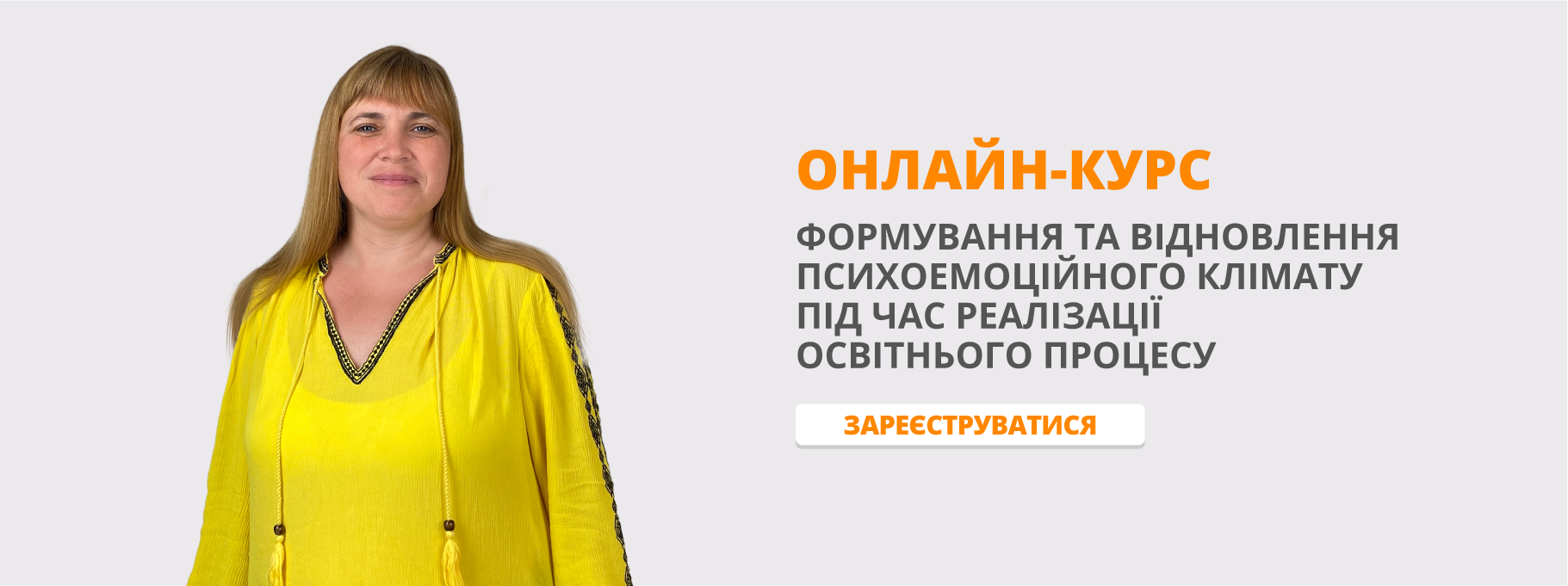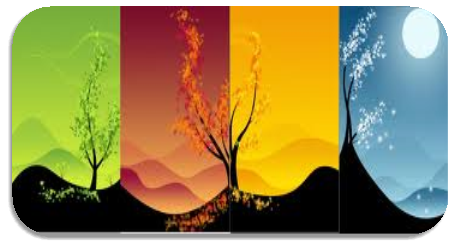Reading is fun. Читати англійською - це весело.
Збірник містить двадцять текстів з розробленими до них завданнями, які можуть бути використані на уроках як елемент перевірки рівня майстерності читання учнів та на уроках домашнього читання з англійської мови. Цікаві та різноманітні завдання допоможуть зробити урок захоплюючим та цікавим.
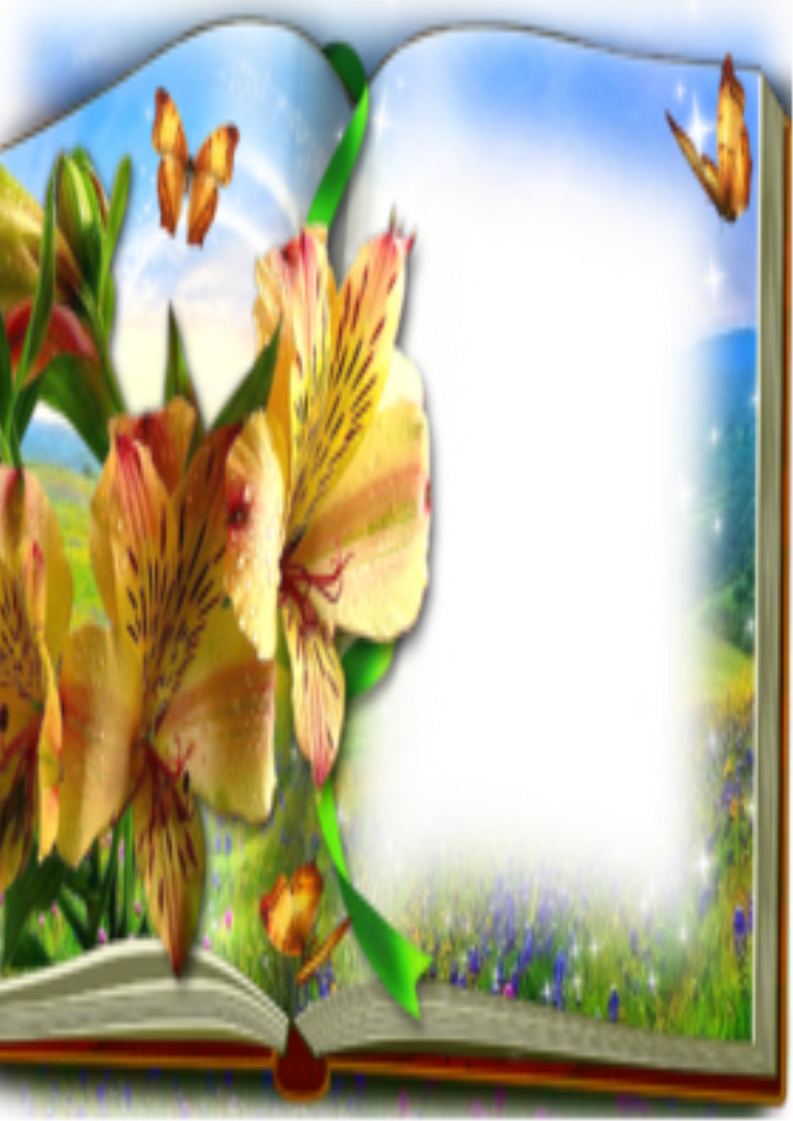
Reading
is
fun


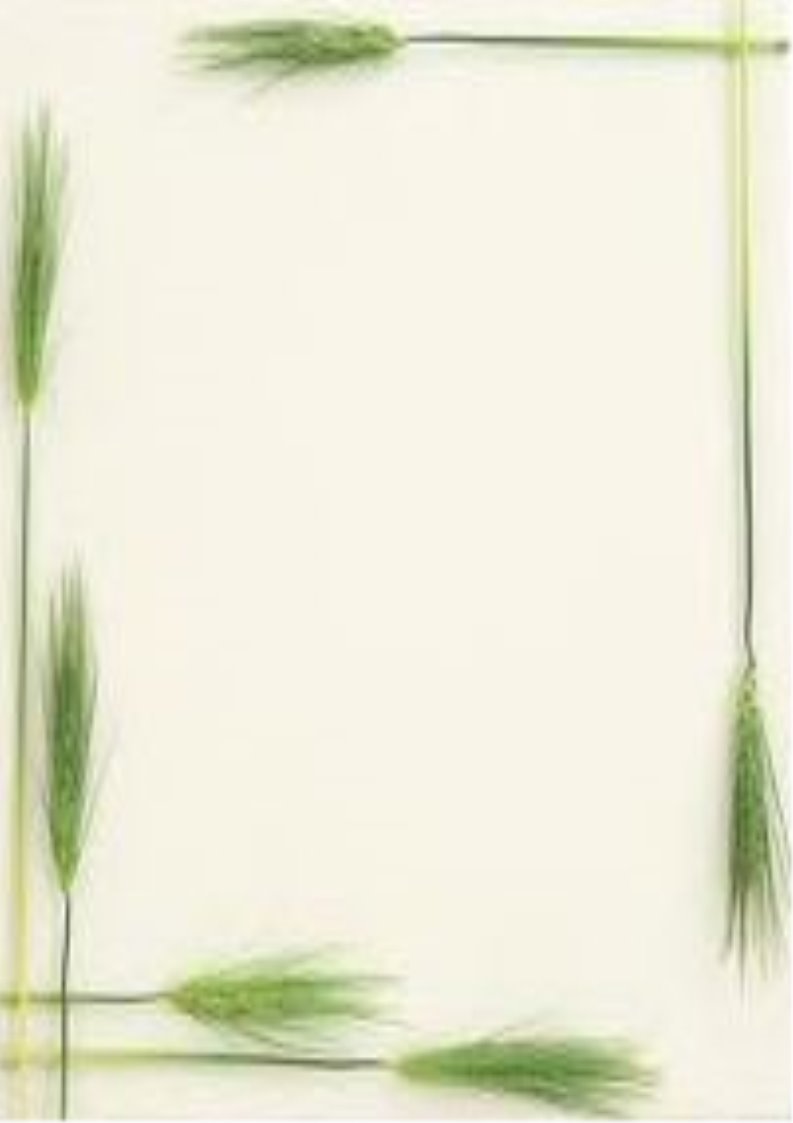 Contents
Contents

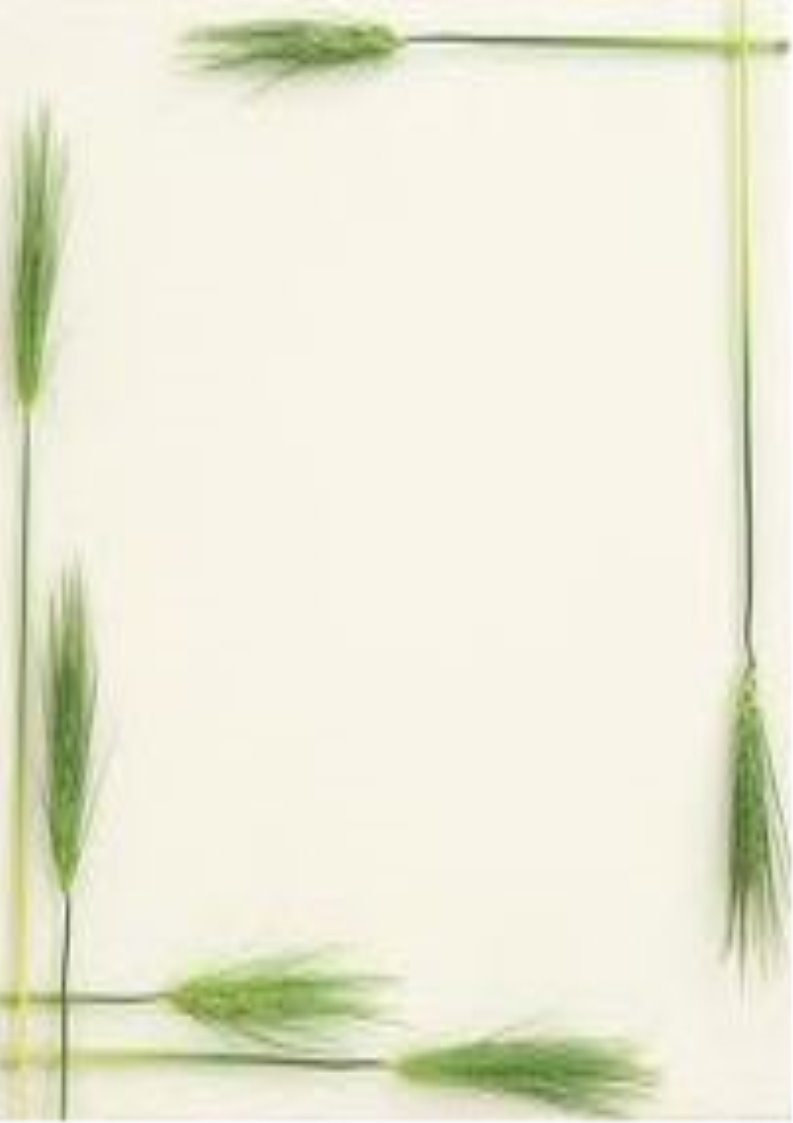 Dear friends!
Dear friends!
We are glad to represent this book for home and class reading. In this book you can find 20 fantastic stories about different people, countries, heroes, cultures and traditions. We can see both famous stories which all of you know and some stories which will be interesting for you and they will become popular soon. These stories will carry you from Ukraine to other fantastic worlds, from reality to fantasy, from yesterday to tomorrow. Also you can check yourself after reading. We have two tasks after each text. The first task is Choose the correct variant and the second one True or False. Also there is small vocabulary of unknown words for each text before the reading and some interesting questions for better understanding the text. This book you can easily use to control the level of reading skill of your pupils and also to give some texts for home reading. We hope that you will like this book. Reader is waiting for you. Get ready for adventures!
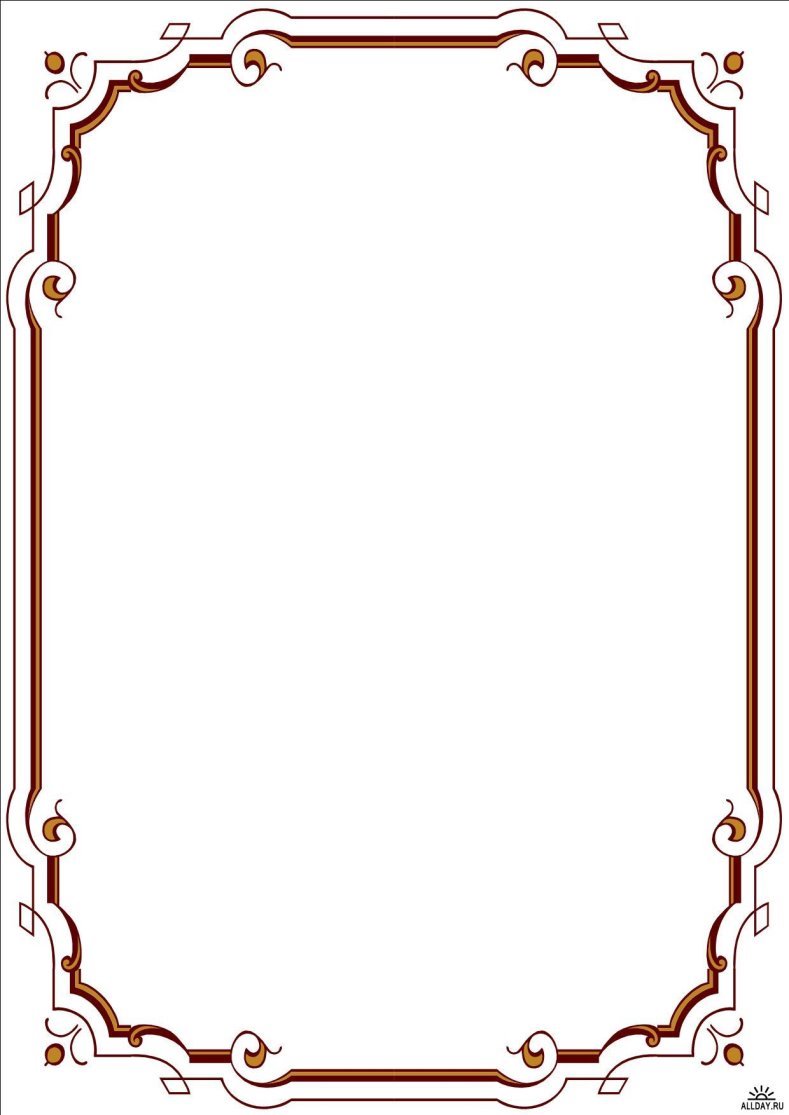
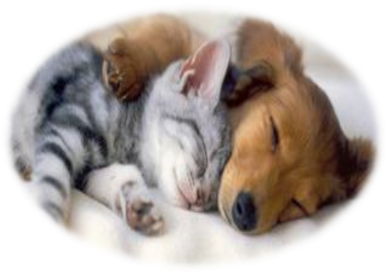 THE MOTHER DOG AND THE KITTENS
THE MOTHER DOG AND THE KITTENS
Pre-reading
Vocabulary
yard [jɑːd] подвір’я
abasket [ˈbɑːskɪt] корзина
tocry [kraɪ] плакати
Answer the following questions
1. What wild animals do you know?
2. What domestic animals do you know?
3. Have you got a pet? What is it?
4. Tell some words about your favourite animal.
Reading
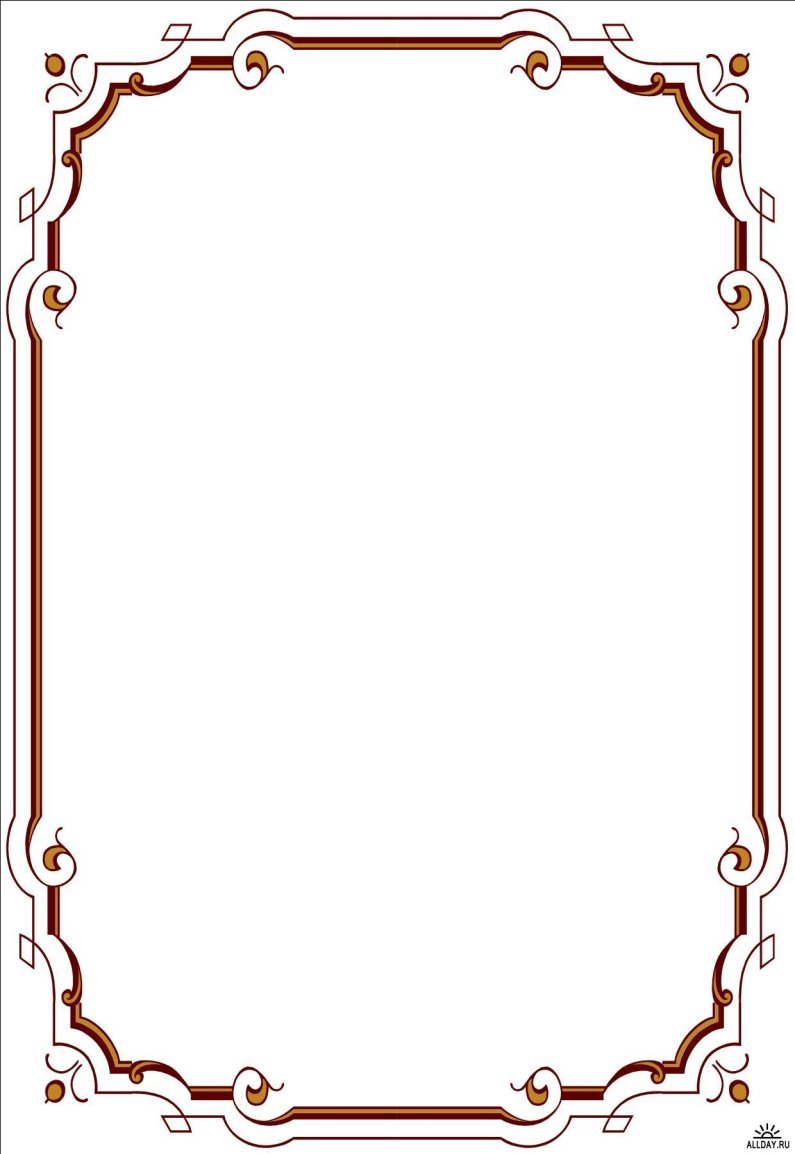
The dog lives in the yard. A box stands in the yard. The dog has got two little puppies in this box. The cat lives in the same yard. A basket stands near the box. The cat has got three little kittens in this basket.
One day the cat goes out of the yard and does not come back. “Where is our mother?” ask the little kittens. And they cry and cry. The dog comes up to their basket. “Don’t cry”, says the dog. “I want to help you”. And the dog takes one of the little kittens and puts it into the box.
The little kitten looks at the puppies. The puppies look at the little kitten. The dog goes to the basket again, and again takes one of the little kittens and puts it into the box. Now two puppies and two kittens are in the box.
The dog goes to the basket again and takes the last little kitten. It puts the kitten into the box, too. “Now you are my children”, says the dog. “I am your mother, and these puppies are your brothers. Play with them”.
And the kittens do not cry. Now they have got a mother and two brothers.
Post-reading
Exercise 1
Choose the correct variant
1. The dog lives …
a) in the box
b) in the yard
c) in the basket
2. How many kittens has the cat got?
a) one
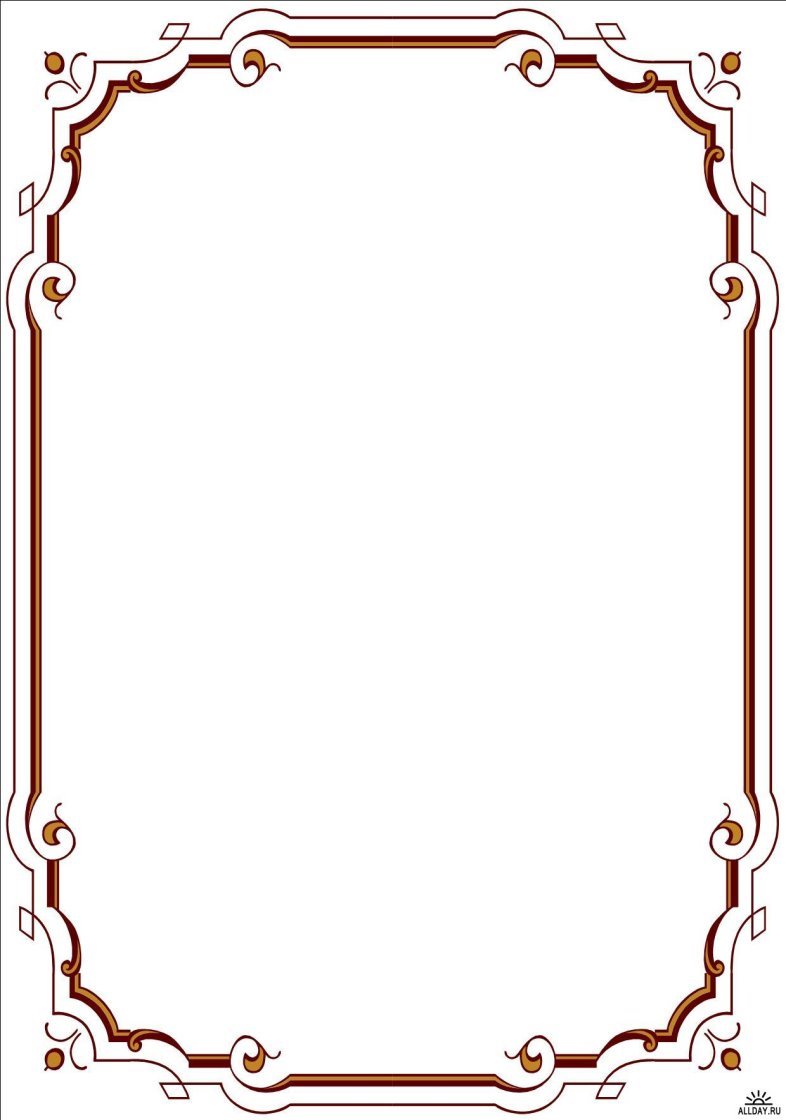
b) two
c) three
3. A basket stands near …
a) the box
b) the house
c) the yard
4. “I want to … you”, says the dog.
a) eat
b) help
c) take
5. Now the kittens have got a mother and…
a) two sisters
b) two brothers
c) two mothers
6. Where does the dog put the kittens?
a) into the box
b) into the basket
c) into the bag
Exercise 2
True or False
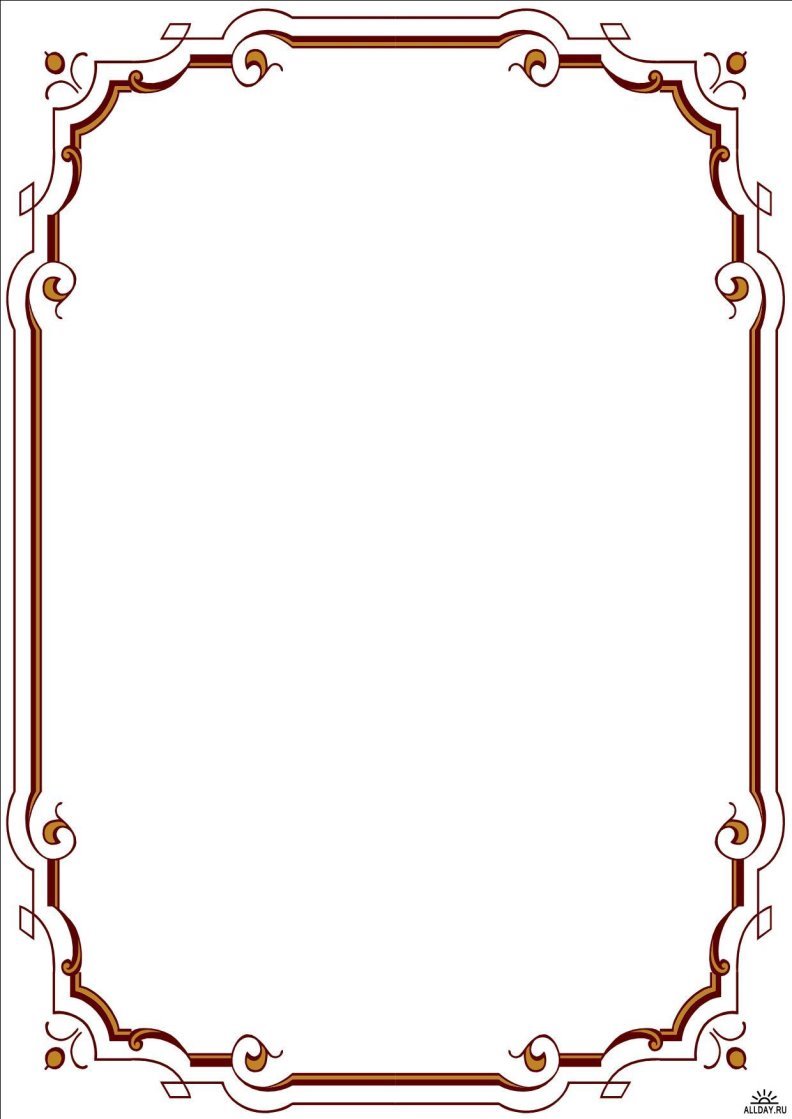
1. The dog lives in the basket.
2. The dog has got two big puppies in the box.
3. The cat has got three little kittens.
4. The dog wants to help the puppies.
5. The dog takes one of the little kittens and puts it into the box.
6. The cat goes to the basket again, and again takes one of the little kittens and puts it into the box.
7. The dog goes to the basket again and takes the last little kitten.
8. “These puppies are your sisters”.
9. And the kittens do not cry.
10. Now they have got a mother and two brothers.
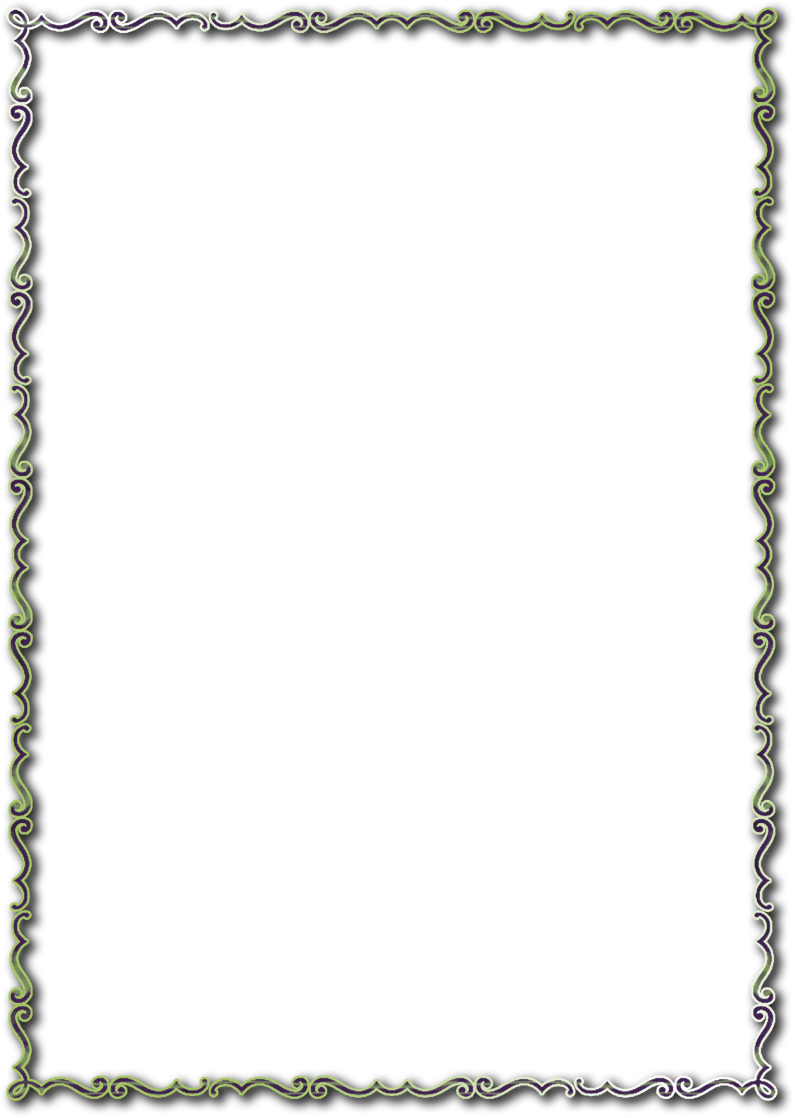
THE YEAR
Pre-reading
Vocabulary
harvest - урожай
to go round - навколо
to plant -садити
to get ripe - доспівати
orchards - сади
meadows - пасіки
Answer the following questions
1.What seasons do you know?
2. What are spring(summer, autumn, winter) months?
3. How many months are there in a year?
4. What is your favourite season? Why?
Reading
A year is a long time—as long as it takes the Earth to go round the sun. Lots of things happen in a year—one spring, one summer, one autumn, and one winter.
Spring is the morning of the year, when everything gets up. Leaves appear on the trees, flowers seem to come out of the ground, the animals that slept all winter come out of their holes. Spring is the time to plant vegetables and flowers. The ground is soft after the snow has melted, and it will soon be warm from the rain and the sun.
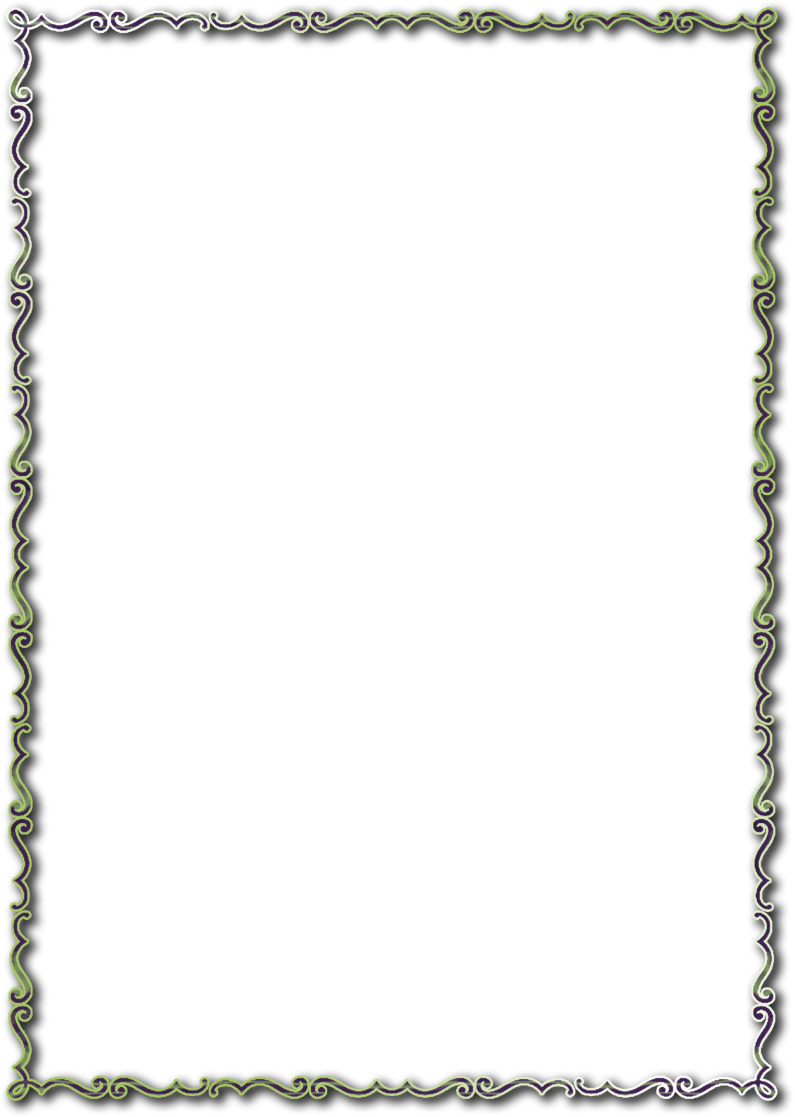 Summer is the day-time of the year. The sun is hot and bright. Plants cannot grow strong and healthy without sunshine. Flowers get bright and fruits get ripe. Birds sing and all things grow.
Summer is the day-time of the year. The sun is hot and bright. Plants cannot grow strong and healthy without sunshine. Flowers get bright and fruits get ripe. Birds sing and all things grow.
Autumn is the evening of the year, harvest time. People gather in the last crops. Some animals grow thicker coats. They will be warm when winter comes. Some animals store food for winter. They will not be hungry in the dark, cold months. Leaves fall to the ground.
Winter is the night-time of the year. Gardens and fields, orchards and meadows rest under the snow. They wait for the warm spring. Many animals rest in their holes. This is the time of the year when the nights are very long and the days are short.
A year is a long time...
Post-reading
Exercise 1
Choose the correct variant
1. The Earth goes round the...
a) the moon
b) the sun
c) the tree
2. How many seasons are there in the year?
a) two
b) three
c) four
3. Everything gets up in...
a) spring
b) winter
c) summer
4. The sun is hot and bright, the birds are singing and the flowers are growing during this season.
a) spring
 b) summer
b) summer
c) autumn
5. What do some animals grow in autumn?
a) harvest
b) thicker legs
c) thicker coats
6. Where do many animals rest in winter?
a) in holes
b) in houses
c) at school
Exercise 2
True or False
1. The ground is soft after the snow has melted, and it will soon be warm from the rain and the sun.
2. Autumn is the evening of the year, harvest time.
3. Winter is not the night-time of the year.
4. Some people store food for winter.
5. Spring is not the time to plant vegetables and flowers.
6. Plants cannot grow strong and healthy without sunshine.
7. Gardens and fields, orchards and meadows rest under the coats.
8. This is the time of the year when the days are very long and the nights are short.
9. Leaves appear on the trees, flowers seem to come out of the ground, the animals that slept all winter come out of their holes.
10. Some birds grow thicker coats.
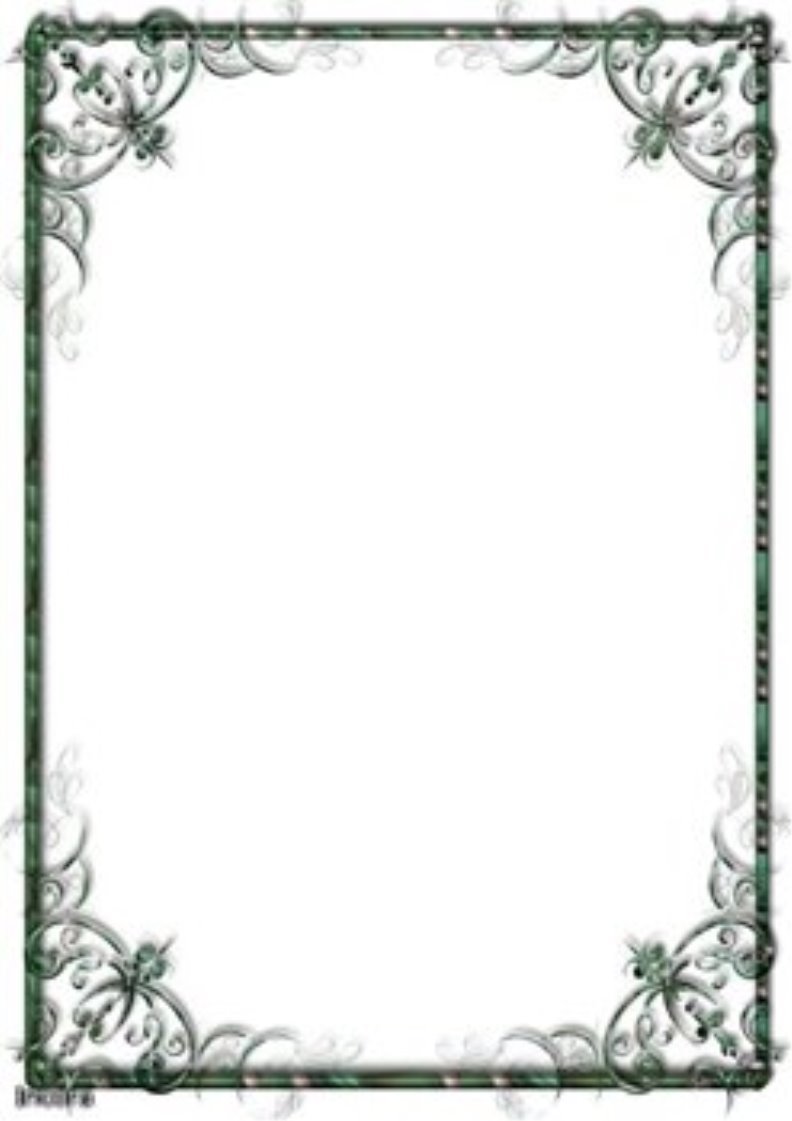
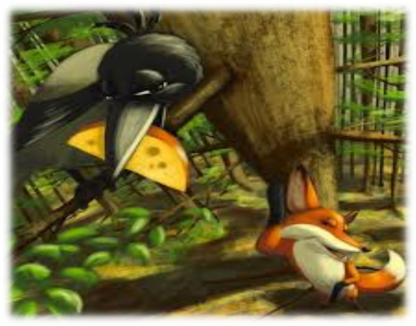
THE CROW AND THE FOX
Pre-reading
Vocabulary
a crow [krəʊ] ворона
what a pity [ˈpɪti] який жаль
to fall [fɔːl] падати
a piece [piːs] кусень
quickly [ˈkwɪkli] швидко
Answer the following questions
1. Do you like to read tales/fables?
2. What famous tales/fables do you know? What is your favourite?
3. Do you like to read tales/fables about people or animals? Why?
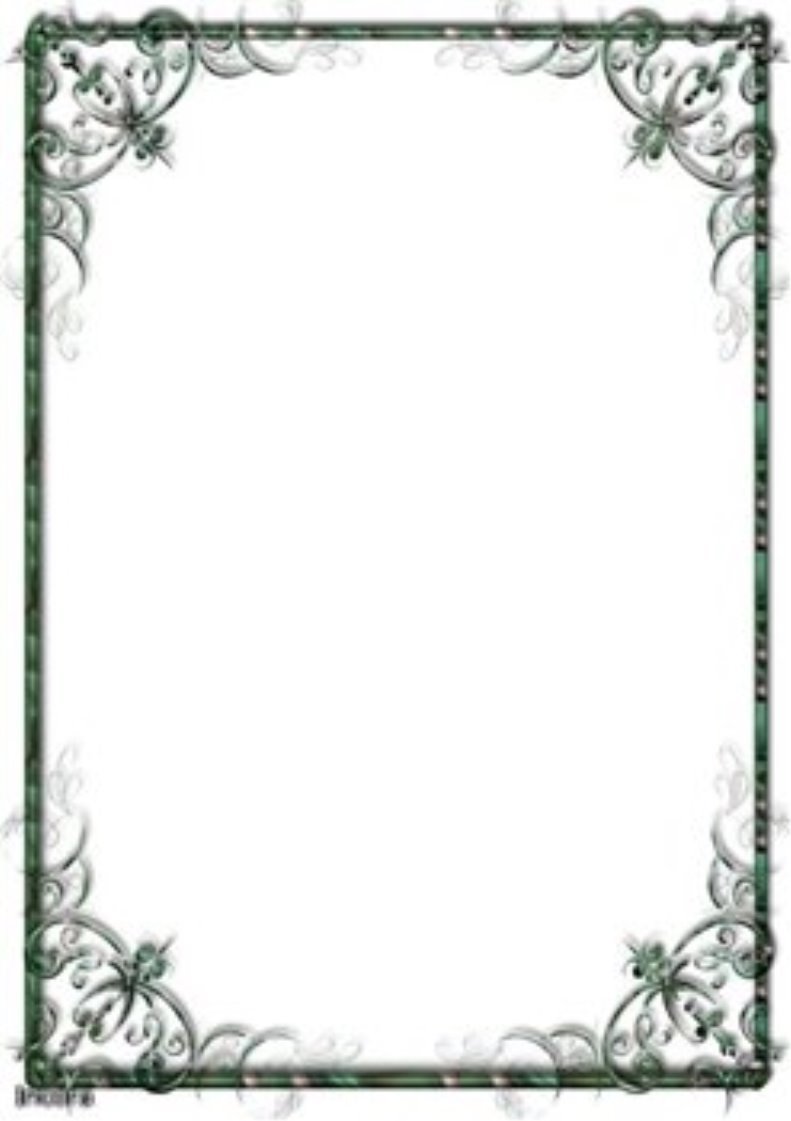 Reading
Reading
A Crow once sat in a tree. She had a large piece of cheese in her mouth. She wanted to eat it, but suddenly she saw a Fox. The Fox came up to the tree. He looked up and saw the Crow. He saw the cheese also. The Fox wanted to get the cheese.
He looked at the Crow and said:
“How beautiful you are, Mrs. Crow! What big eyes you have! What a pity you can’t sing.”
The Crow opened her mouth and said:
“Of course I can sing. Car-r! Car-r!”
When the Crow opened her mouth, the piece of cheese fell out. The Fox ran up to the cheese and quickly ate it up.
“Thank you very much,” he said. “The cheese was good and you sang well. What a pity you don’t think well.”
Post-reading
Exercise 1
Choose the correct variant
1. A Crow once sat in a…
a) box
b) house
c) tree
 2. The Crow had a large piece of … in her mouth.
2. The Crow had a large piece of … in her mouth.
a) cheese
b) cake
c) apple
3. Who came up to the tree?
a) the Bear
b) the Fox
c) the Hare
4. What did the Crow do?
a) opened her mouth
b) said “Hello!”
c) sang a song
5. What did the Fox do with the piece of cheese?
a) he ran away with it
b) he took it
c) he ate it
6. What can the Crow do?
a) sing
b) dance
c) speak
 Exercise 2
Exercise 2
True or False
1. A Crow once sat in a tree.
2. She had a large piece of cheese in her mouth.
3. She wanted to eat it, but suddenly she saw a Bear.
4. The Fox wanted to get the apple.
5. The Fox ran up to the cheese and quickly ate it up.
6. The cheese was not good.
7. The Crow opened her eyes.
8. When the Crow opened her mouth, the piece of cheese fell out.
9. The Fox came up to the tree.
10. Of course I can sing. Bow-wow-wow!

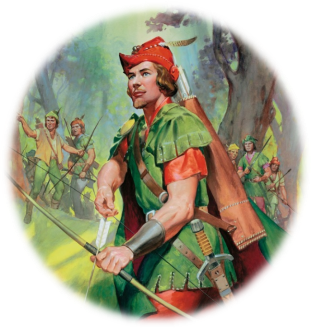
ROBIN HOOD
Pre-reading
Vocabulary
a hero - герой
to refuse - відмовляти
a priest - священник
to marry - одружуватись
to pull off - знімати
Answer the following questions
1. Do you like to read?
2. Do you read legends or fairy tales?
3. How often do you read?
4 Can you name the most interesting legends or fairy tales?
Reading
Robin Hood is a legendary hero of England. He lived in the twelfth century. The legend said Robin Hood lived in Sherwood Forest with his merry men.
Robin Hood and his merry men took money from the rich and gave it to the poor. There are many stories about them. Here is one of them.
 One day Robin Hood was walking through the forest with his men when he saw a young man. The young man was wearing a very fine red coat and singing merrily. The next morning Robin Hood saw the same young man without his fine coat. The young man was looking very sad. Robin Hood sent Little John to bring the young man. When the young man came to Robin Hood the latter asked him, “What is your name?” The young man answered that his name was Allan-a-Dale. Then Robin Hood asked:
One day Robin Hood was walking through the forest with his men when he saw a young man. The young man was wearing a very fine red coat and singing merrily. The next morning Robin Hood saw the same young man without his fine coat. The young man was looking very sad. Robin Hood sent Little John to bring the young man. When the young man came to Robin Hood the latter asked him, “What is your name?” The young man answered that his name was Allan-a-Dale. Then Robin Hood asked:
“Have you any money?” Allan-a-Dale answered, have only five shillings and a ring that I have kept for seven years. I wanted to marry a nice young girl. Yesterday I went to marry her, but her father is against it. He wants to marry her to a rich old man. Now I am unhappy." Robin Hood asked the young man:
“What will you give me and my merry men if we help you to get your girl back again?” Allan-a-Dale had neither money nor gold, but he promised to be Robin Hood’s true servant. So Robin Hood decided to help Allan-a-Dale and they all went to the town where the girl lived. When they came to the town they saw the girl Allan loved. She was going into the church with the rich old man. Robin Hood and his men went into the church and asked the priest to marry the girl to Allan-a-Dale.
When the priest refused, Robin Hood pulled off the priest’s coat and put it on Little John. So Little John married the young people and they returned together to the merry Greenwood.
Post-reading
Exercise 1
Choose the correct variant
1. Robin Hood is a legendary hero of...
a) Ukraine
b) France
c) England
2. One day Robin Hood was walking through the forest with his men when he saw a young...
 a) man
a) man
b) girl
c) boy
3. The young man was looking very ...
a) happy
b) sad
c) glad
4. He wants to marry her to a ... old man.
a) poor
b) handsome
c) rich
5. Robin Hood and his men went into the ... and asked the priest to marry the girl to Allan-a-Dale.
a) school
b) house
c) church
6. When the priest refused, Robin Hood pulled off the priest’s ... and put it on Little John.
a) hat
b) coat
c) dress
Exercise 2
True or False
1. The legend said Robin Hood lived in Sherwood Forest with his merry men.
2. One day Robin Hood was walking through the forest with his men when he saw a young girl.
3. The next year Robin Hood saw the same young man without his fine coat.
4. The young man was looking very happy.
5. When the young man came to Robin Hood the latter asked him, “What is your name?”
 6. When they came to the town they saw the dog Allan loved.
6. When they came to the town they saw the dog Allan loved.
7. Robin Hood and his men went into the church and asked the priest to marry the girl to Allan-a-Dale.
8. Yesterday I went to marry her, but her mother is against it.
9. When the priest refused, Robin Hood pulled off the priest’s coat and put it on Little John.
10. So Little John married the old people and they returned together to the merry Greenwood.
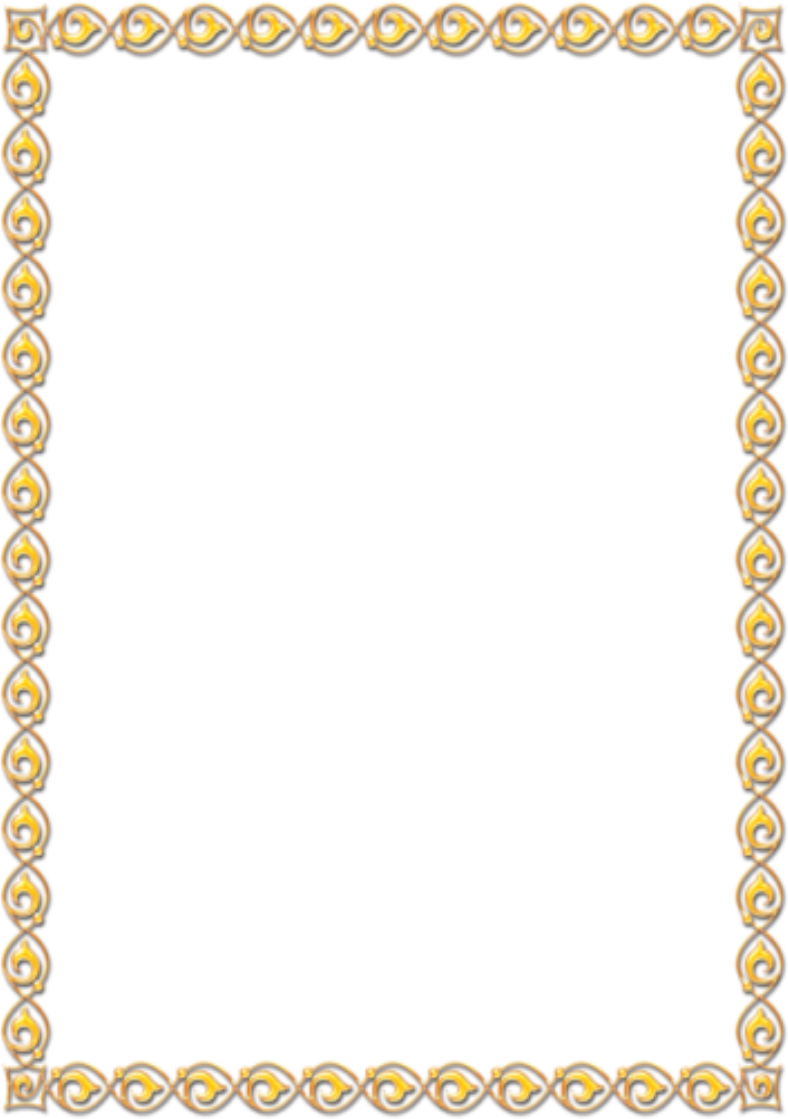
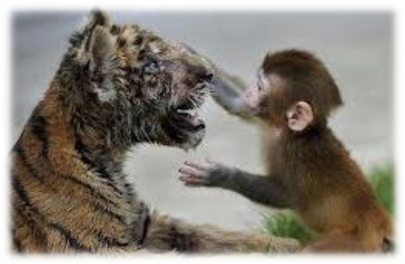
THE TIGER AND THE MONKEY
Pre-reading
Vocabulary
jungle [ˈdʒʌŋɡl] джунглі
hungry [ˈhʌŋɡri] голодний
avillage [ˈvɪlɪdʒ] селище
another [əˈnʌðə(r)] інший
Answer the following questions
1. What wild animals do you know?
2. Are you afraid of them? Why?
3. Have you ever been in the jungle? Would you like to go there one day?
Reading
An old Tiger lived in India in the jungle. Every day he asked one of the animals to bring him something to eat. One morning the Tiger was very hungry. He saw a Monkey and said: “I am hungry, Monkey. Go to the village and bring me a fat pig.”
 “Oh, Tiger,” cried the Monkey, “I can’t do that. Yesterday another tiger, who is younger and stronger than you are, told me not to bring you anything. He spoke to me in such an angry voice that I ran away.”
“Oh, Tiger,” cried the Monkey, “I can’t do that. Yesterday another tiger, who is younger and stronger than you are, told me not to bring you anything. He spoke to me in such an angry voice that I ran away.”
“What?” cried the old Tiger. “Show me that tiger. I shall speak to him.”
“Come with me,” said the Monkey. “I know where he lives.”
The Tiger and the Monkey went to a large river.
“Now look into the river,” said the Monkey. “Do you see there in the river the head, the white teeth and the large green eyes of another tiger?”
“Yes, I do,” cried the old Tiger. “I shall eat him up!”
And with these words he sprang into the river, and the Monkey saw him no more.
Post-reading
Exercise 1
Choose the correct variant
1. An old Tiger lived in …
a) Africa
b) India
c) Great Britain
2. One morning the Tiger was very …
a) hungry
b) naughty
c) tired
3. Who did the Tiger see?
 a) bear
a) bear
b) snake
c) monkey
4. What did the Tiger ask to bring him?
a) a fat cow
b) a fat sheep
c) a fat pig
5. Another tiger was stronger and …
a) younger
b) older
c) smarter
6. Where did The Tiger and the Monkey go to?
a) a river
b) a large river
c) a large lake
Exercise 2
True or False
1. The Tiger saw a Monkey.
2. An old Tiger lived in Africa in the jungle.
3. Every week the Tiger asked one of the animals to bring him something to eat.
4. The Tiger sprang into the river.
 5. The Tiger and the Monkey went to a large river.
5. The Tiger and the Monkey went to a large river.
6. The Monkey was not afraid of another Tiger.
7. One morning the Tiger was not very hungry.
8. The Monkey did not run away.
9. The Monkey saw the Tiger no more.
10. “Go to the village and bring me a fat pig.”

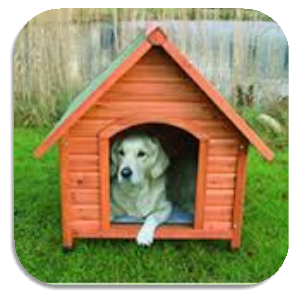
THE DOG’S KENNEL
Pre-reading
Vocabulary
kennel – дім для собаки
Answer the following questions
1. Do you like animals?
2. Do you have pets at home?
3. What is your favorite pet?
4. Would you like to have a pet and why or why not?
Reading
Bill and Sam are brothers. They live in a village. Their family has a large garden. In the garden there is a dog’s kennel. Sam’s dog, Jack, lives there.
One day the children say to themselves, “Our dog is very big and this kennel is too small for the dog. Let’s make a new kennel for our Jack.”
On Sunday the boys begin to make a new big kennel for the dog.
The weather is not very good. It is going to rain and the children want to finish the kennel before it rains.
In the afternoon the boys finish their work, but the dog does not want to go into the kennel. Then Bill says, "Let’s take a piece of meat and put it in the middle of the kennel.''
 But the brothers do not have time to do it. It begins to rain and the dog runs into its kennel itself. Now the children are happy, their dog has new big kennel, and it is very nice.
But the brothers do not have time to do it. It begins to rain and the dog runs into its kennel itself. Now the children are happy, their dog has new big kennel, and it is very nice.
Post-reading
Exercise 1
Choose the correct variant
1. Bill and Sam are....
a) sisters
b) aunt and uncle
c) brothers
2. We can find ....in the garden.
a) a tree
b) a kennel
c) a wild animal
3. Boys decided to make...
a) a new kennel
b) a new house
c) a new garage
4. The boys begin to make a new kennel on...
a) Wednesday
b) Saturday
c) Sunday
5. Bill decided to put a piece of ....in the middle of the kennel.
a) chalk
b) vegetables
c) meat
6. After the dog run in the kennel, boys were ...
a) happy
b) sad
c) tired

Exercise 2
True or False
1. Their family has a large garden.
2. The weather is not very bad.
3. It is going to rain and parents want to finish the kennel before it rains.
4. Now the children are happy, their dog has new big kennel, and it is very nice.
5. On Sunday the boys begin to make a new big kennel for the cat.
6.The brothers do not have time to do it.
7. Our dog is very small and this kennel is too small for the dog.
8. Let’s make a new kennel for our Jack.
9. They live in a city.
10. Bill and Sam are brothers.
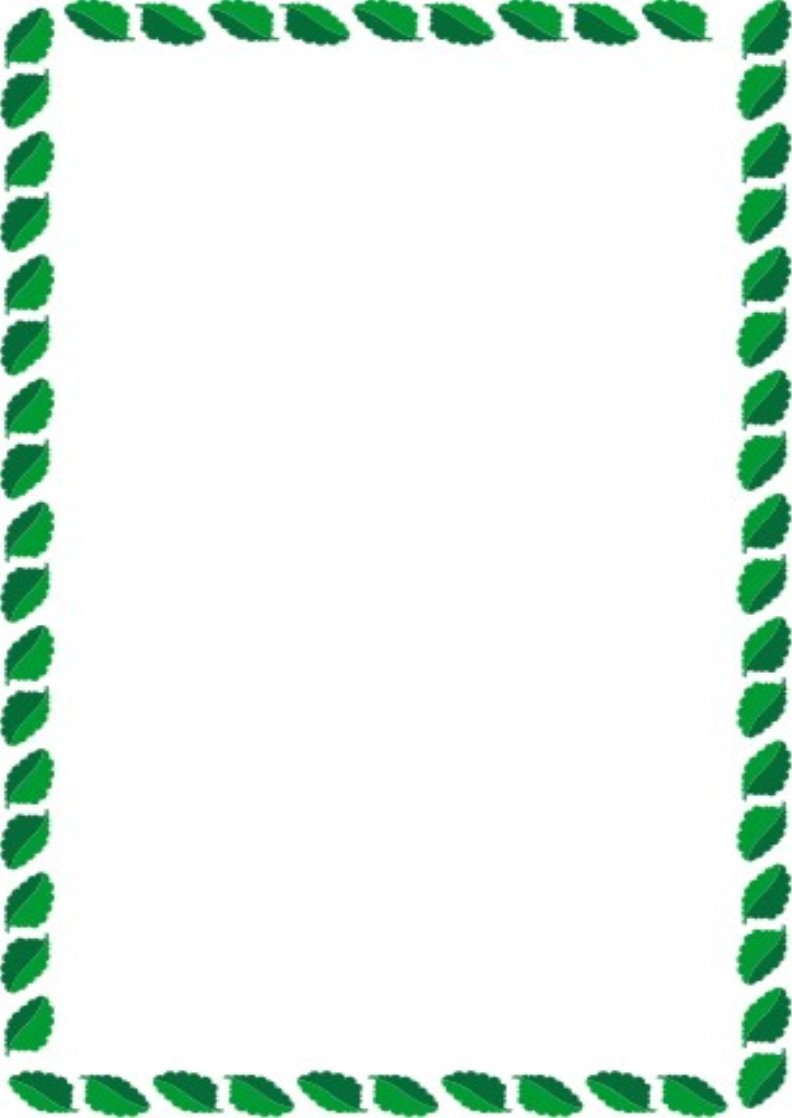
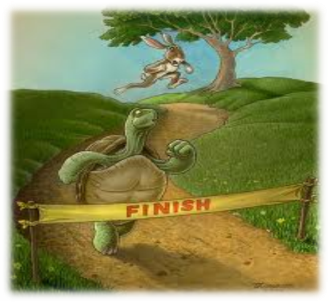
THE HARE AND THE TURTLE
Pre-reading
Vocabulary
to laugh at [lɑːf] сміятися над кимось
race [reɪs] забіг
a road [rəʊd] дорога
to pass [pɑːs] пройти, минати
Answer the following questions
1. Do you like to read tales/fables?
2. What famous tales/fables do you know? What is your favourite?
3. Do you like to read tales/fables about people or animals? Why?
Reading
The Hare Laughs at the Turtle
HARE. Mr. Turtle, how slow you are!
 TURTLE. Slow? Who says I am slow, Mr. Hare?
TURTLE. Slow? Who says I am slow, Mr. Hare?
HARE. I do. You can’t run; you only walk.
TURTLE. And you, Mr. Hare, are you not slow?
HARE. Of course, I am not. I can run very quickly.
TURTLE. I didn’t know about that. I am sure that I can walk as quickly as you can.
HARE. How can you, a turtle, say that you can walk as quickly as I can!
TURTLE. I am sure that I can.
HARE. Very well, we shall see. Let us run a race. Let us see which of us can get to that tree first. We shall soon know which of us can run quicker.
TURTLE. All right. But who will be there to see who gets to the tree first?
HARE. I shall ask Mr. Fox. He will be glad to do that for us.
TURTLE. Very well, Mr. Hare. When shall we run?
HARE. First I must get Mr. Fox.
TURTLE. I am ready at one minute.
The Hare and the Turtle Run to the Tree
(The Hare and the Turtle are running the race. The Hare is far in front of the Turtle. The Fox is standing at the tree.)
HARE.(Stops under a tree near the road.)Well, I am hot. I think that I shall lie down here and rest a minute. (The Hare lies down to rest, but he does to sleep. After a few minutes the Turtle comes down to the road.)
TURTLE. Oh, there is Mr. Hare. He is asleep near the road. I shall pass him and he will not hear me. (The Turtle walks on. The Hare is still asleep.)
 At the Tree
At the Tree
FOX. Good old Mr. Turtle! So you are here first! How did you get here so quickly?
TURTLE. Well, Mr. Fox, I shall tell you. I walk slowly but I never stop, and of course I don’t lie down near the road and sleep when I want to get to a place.
FOX. Well, well. …Ah, here comes Mr. Hare. Let’s see what he will say. Mr. Hare, Mr. Turtle got here first.
HARE. What? Is Mr. Turtle here already? How did you get here so quickly, Mr. Turtle?
TURTLE. Slowly but surely, Mr. Hare, slowly but surely! I walked and walked, and at last I got to the tree.
HARE. Did you see me near the road?
TURTLE. Yes, I saw you. I passed near you and you did not hear me.
FOX. Now, Mr. Hare, you see that Mr. Turtle is not so slowly as you thought.
TURTLE. And you can’t laugh at me now, Mr. Hare, but I can laugh at you. Good-bye, Mr. Fox, and thank you. Good-bye, slow Mr. Hare!
Post-reading
Exercise 1
Choose the correct variant
1. Who can run very quickly?
a) a hare
b) a turtle
 c) a fox
c) a fox
2. Where did they get?
a) to the house
b) to the road
c) to the tree
3. The Hare lies down to …
a) rest
b) sing
c) dance
4. Who is asleep near the road?
a) Mr. Fox
b) Mr. Hare
c) Mr. Turtle
5. Who got to the tree first?
a) Mr. Fox
b) Mr. Hare
c) Mr. Turtle
6. How many animals are there?
a) two
b) three
c) four
 Exercise 2
Exercise 2
True or False
1. Mr. Hare can run very quickly.
2. “Let us run a race”.
3. Mr. Fox asked Mr. Hare to be there.
4. After a few minutes the Turtle comes down to the village.
5. The Fox is standing at the tree.
6. The Hare Laughs at the Fox.
7. The Hare lies down to rest, but he does to sleep.
8. The Hare and the Turtle are not running the race.
9. The Turtle walks on. The Hare is not still asleep.
10. The Hare and the Turtle Run to the Tree.

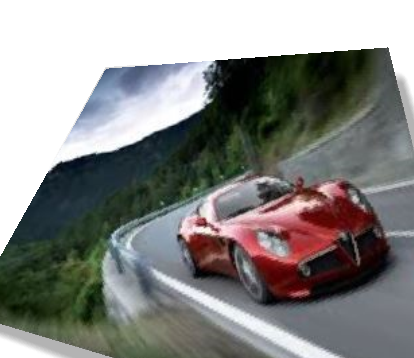
KEVIN'S CAR
Pre-reading
Vocabulary
a magazine [ˌmæɡəˈziːn] журнал
a show [ʃəʊ] шоу
dangerous [ˈdeɪndʒərəs] небезпечний
to decide [dɪˈsaɪd] вирішувати
to hang [hæŋ] розвішувати
a mechanic [məˈkænɪk] механік
to believe [bɪˈliːv] вірити
a creation [kriˈeɪʃən] творіння
Answer the following questions
1. Have you got many toys? What toys have you got?
 2. Do you like to play with your toys? Why?
2. Do you like to play with your toys? Why?
3. What is your favourite toy?
Reading
Kevin likes cars. He reads about cars in magazines and he watches shows about cars on TV. His head is full of cars!
He tells his parents, "Please, please, please, could you buy me a car?"
"No," says Kevin's mom, "You are too young to drive a car. This is dangerous."
"No," says Kevin's dad, "A car is very expensive. We can't buy you a car now."
Kevin is very sad. He wants a car. He wants a fast red sports car!
He decides to build one! He buys books and reads about the subject. He hangs around at the garage and watches the mechanics fix the cars. It is very interesting for him and he has a lot of fun.
Finally, he starts building his own car! He tells his parents about it. His father doesn't believe him. He says it's too difficult. His mother says she is worried. She doesn't want him to do anything dangerous.
After two months, Kevin invites his parents to see his creation. His parents are surprised! It is beautiful! It is red! It is shiny! It is a big toy sports car! Kevin can sit inside it and drive!
Kevin's parents are very happy and proud. Kevin's dad says: "I was sure you can do it!"
Kevin's mom says: "I was sure it was not dangerous!"
Kevin smiles and drives away.
 Post-reading
Post-reading
Exercise 1
Choose the correct variant
1. What does Kevin like?
a) horses
b) bikes
c) cars
2. Where does he read about cars?
a) in magazines
b) in books
c) in newspapers
3. He wants a fast … sports car!
a) blue
b) black
c) red
4. A car is very…
a) dangerous
b) cheap
c) expensive
5. His … doesn't believe him.
a) mother
 b) father
b) father
c) uncle
6. After … months, Kevin invites his parents to see his creation.
a) one
b) two
c) three
Exercise 2
True or False
1. Kevin likes horses.
2. Kevin's parents are very happy and proud.
3. He wants a fast black sports car!
4. Kevin smiles and drives away.
5. He reads about cars in magazines and he watches shows about cars on TV.
6. Kevin's dad says: "I was sure it was not dangerous!"
7. He hangs around at the garage and watches the mechanics brake the cars.
8. Kevin's mother says: "I was sure you can do it!"
9. His head is full of horses!
10. After four months, Kevin invites his parents to see his creation.
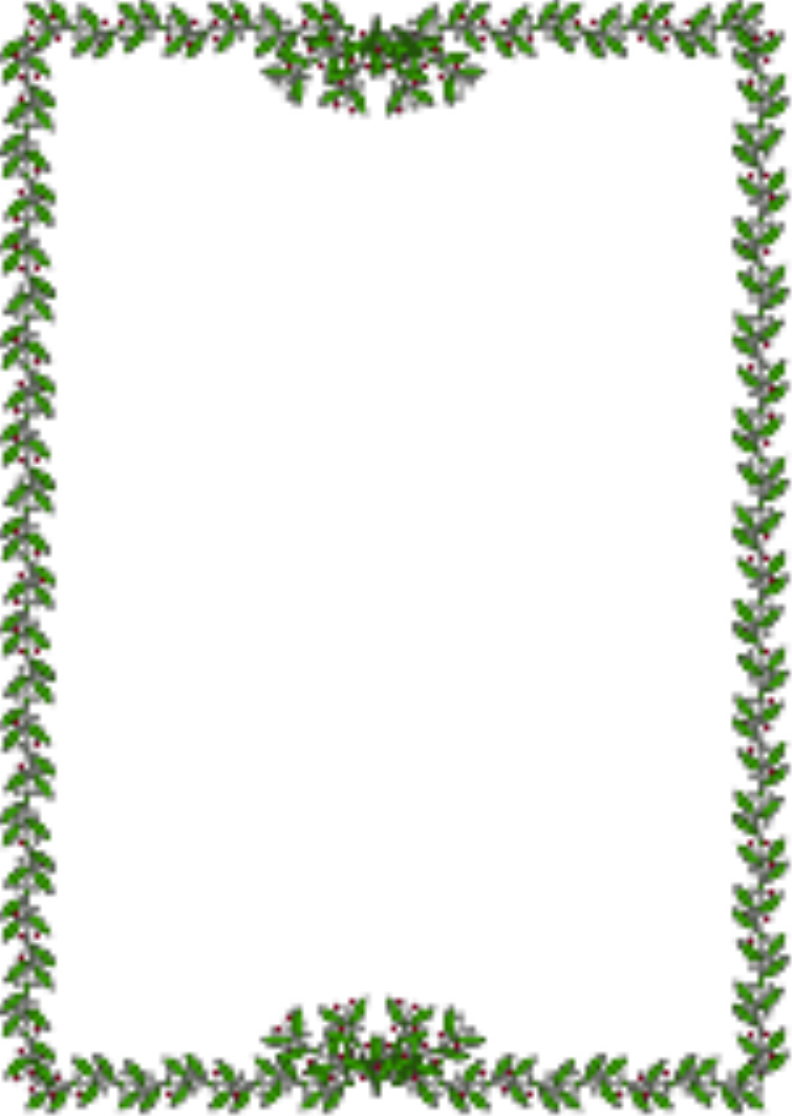
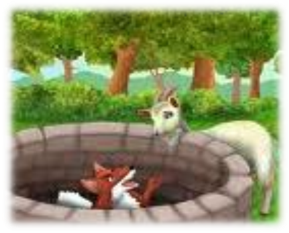
THE FOX AND THE GOAT
Pre-reading
Vocabulary
a well [wel] колодязь
clear [klɪə(r)] чистий, ясний
to come down [kʌm‘daʊn] спускатися
to catch [kætʃ] зловити
Answer the following questions
1. Do you like to read tales/fables?
2. What famous tales/fables do you know? What is your favourite?
3. Do you like to read tales/fables about people or animals? Why?
Reading
(A Fox is in a well and can’t get out. A Goat passes by.)GOAT. At last, here is a well. Now I can have a drink. I need a good drink, too, after such a long walk. (He sees the Fox in the well.) Foxie, Foxie, what are you doing down there?

FOX. Oh, I am having a drink.
GOAT. Is the water down there better than the water up here?
FOX. Oh, yes, much better. It’s clearer and colder down here. Come down and try it, Goat.
GOAT. All right, I shall. I need a good drink of cold water.
FOX. Jump down, then, and I shall catch you.
GOAT. Catch me, then; here I come. (The Goat jumps down.)
FOX. Now, have a drink, Goat. Isn’t this water good?
GOAT. Very good, Foxie.
FOX. And now, Goat, let me ask you how you are going to get out of this well.
GOAT. I did not think of that. How are you going to get out of it, Foxie?
FOX. I don’t know. I can’t find an answer to the question.
COAT. That’s too bad.
FOX. Wait a minute! I know what to do now.
GOAT. What? Tell me, Foxie, please tell me.
FOX. Let me get on your back and I shall jump out; then, of course, I shall help you out.
GOAT. All right, Foxie. I am ready. Get upon my back.
FOX. Thank you, Goat. One jump and I’m out! I’m out! Good-bye, Goat! Thank you very much.

COAT. Wait, wait, Foxie! I am still in the well. Help me out!
FOX. Let me tell you something, Goat. You are not very clever. You didn’t think when you jumped into the well. You must always think before you do anything. Good-bye, Goat. I have no time to help you now. Good-bye! (The Fox goes away, and the Goat remains in the well.)
Post-reading
Exercise 1
Choose the correct variant
1. A Fox is in a …
a) well
b) house
c) hole
2. Who passes by?
a) a wolf
b) a bear
c) a goat
3. What is Fox doing in a well?
a) reading a book
b) having a drink
c) eating meat
4. The water is clearer and …
 a) warmer
a) warmer
b) colder
c) tastier
5. Where does Fox get on?
a) Goat’s back
b) Goat’s shoulders
c) Goat’s neck
6. The Fox goes away, and the Goat remains in the …
a) well
b) house
c) hole
Exercise 2
True or False
1. The Fox sees the Goat in the well.
2. The Fox is not having a drink there.
3. The Goat does not know what to do.
4. The Fox goes away, and the Goat remains in the well.
5. The water is not clearer and colder down there.
6. A Fox is in a well and can’t get out.
7. The Fox helped the Goat.
 8. The Goat jumps up.
8. The Goat jumps up.
9. The Fox does not know what to do.
10. A Wolf passes by.
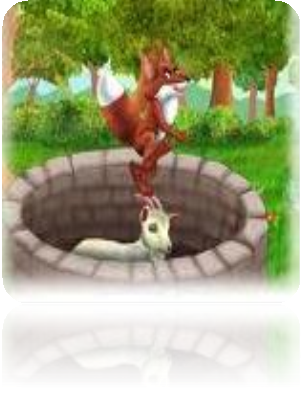
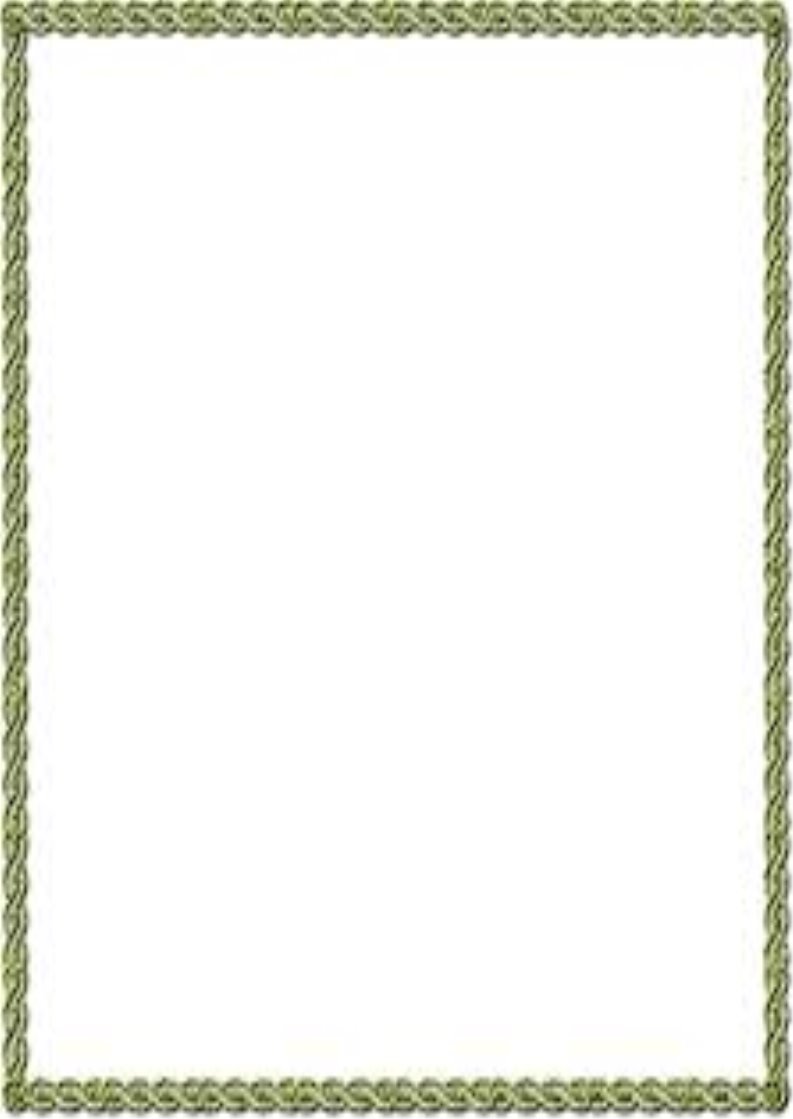

WHY THE TREE HAD NO APPLES ON IT
Pre-reading
Vocabulary
an oak tree - дуб
an orchard - сад
to pass - проходити, долати
an exception - виняток
Answer the following questions
1. Do you like fruit?
2. What kinds of fruit do you like most оf all?
3. But do you know some trees without fruit or vegetables?
4. Can you name such trees?
Reading
One Sunday morning, two men who lived in a town went to the country. They went by car. They passed a river and then a small forest and then they came to a large orchard. In the orchard there were a lot of apple-trees and they all had apples on them except one tree. This tree had no apples at all on it.
One man asked the other, “Why has that tree no apples when the others all have a lot of apples on them?”
 “1 don’t know,” answered the other man. “Let’s stop and ask that little boy who is sitting at the bus-stop.”
“1 don’t know,” answered the other man. “Let’s stop and ask that little boy who is sitting at the bus-stop.”
So they stopped the car and got out of it. The little boy came from a village and he was glad to see the car. There were no other people near him and no bus and he wanted to go to the village by car. He said to the men, “Will you give me a lift in your car to the village?”
The man said, “All right, get in. But tell us why that tree has no apples on it and all the others have a lot.”
The boy got in the car and then he said:
“Well, that’s an easy question to answer. That tree had no apples on it because it is not an apple-tree — it’s an oak-tree.”
Post-reading
Exercise 1
Choose the correct variant
1. One Sunday morning, two men who lived in a town went to...
a) the country
b) the village
c) the city
2. They passed .....and then a small forest and then they came to a large orchard.
a) a lake
b) a sea
c) a river
3. They all had ....on them except one tree.
a) carrots
b) onions
c) apples
4. The little ....came from a village and he was glad to see the car.
a) girl
b) boy
c) uncle
 5. The boy got in the ....and then he said.
5. The boy got in the ....and then he said.
a) car
b) house
c) school
6. That tree had no apples on it because it is not an apple-tree — it’s an.....
a) fir-tree
b) banana-tree
c) oak-tree
Exercise 2
True or False
1. They passed a river and then a small forest and then they came to a large house.
2. This tree had no apples at all on it.
3. There were no other pupils near him and no bus and he wanted to go to the village by car.
4. That’s a difficult question to answer.
5. In the orchard there were a lot of apple-trees and they all had apples on them except one tree.
6. Tree has no apples on it and all the others have a lot.
7. You will give me a lift in your bus to the village.
8. Let’s stop and ask that little girl who is sitting at the bus-stop.
9. That tree had no apples on it because it is not an apple-tree — it’s an oak-tree.
10. They went by car to the city.
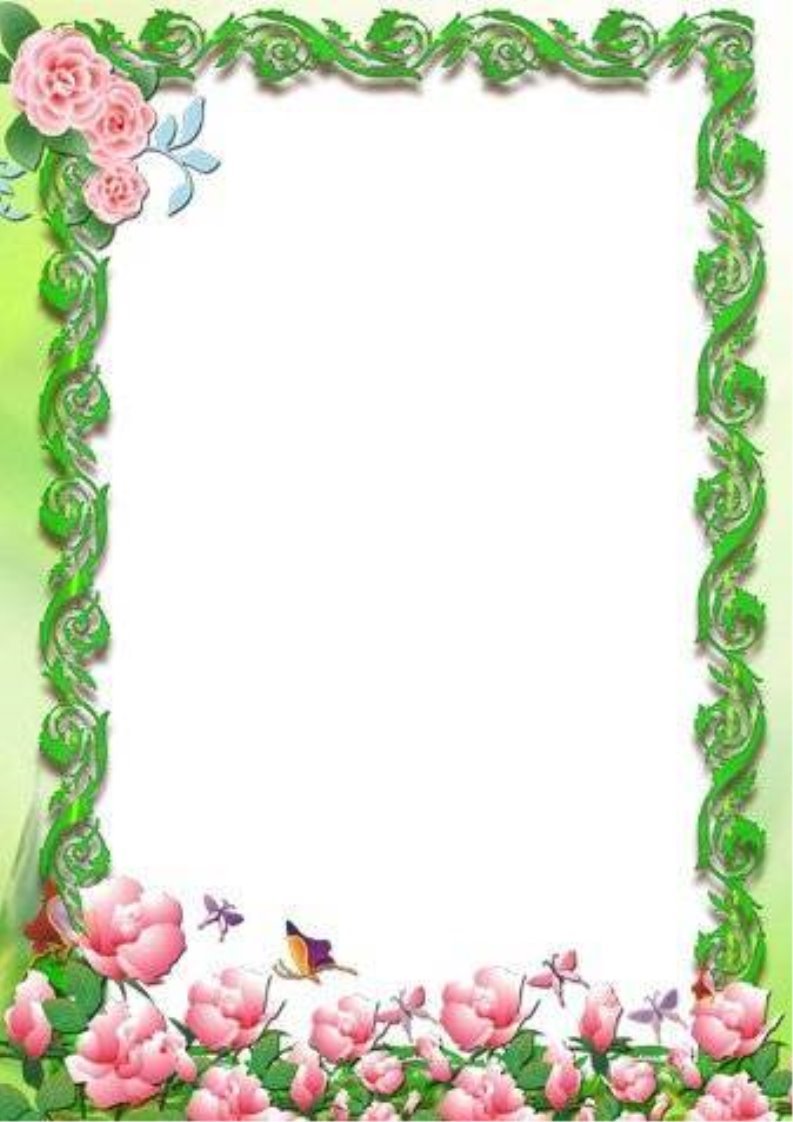
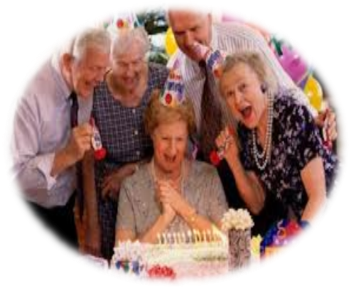 GRANDMA’S BIRTHDAY
GRANDMA’S BIRTHDAY
Pre-reading
Vocabulary
special[ˈspeʃl] особливий
to smell [smel] пахнути
delicious [dɪˈlɪʃəs] чудовий
a bowl [bəʊl] миска
Answer the following questions
1. Do you like to have a birthday party? Why?
2. Do you always get many presents? What present did you get last year?
3. Do you like to give presents? What presents do you like to give?
4. Do you always celebrate your birthday?

Reading
Yesterday it was Grandma’s birthday so Kate and Jane’s mother cooked a special dinner for Grandpa and Grandma. The girls helped their mother. Kate prepared some vegetables and Jane helped Mother to cook some chicken. The food smelled delicious.
Then Kate put some fruit in a bowl. First she put some oranges in the bowl. Then she put in some strawberries. After that she put some grapes on top of the fruit in the bowl.
Jane laid the table for dinner. She put the bowl of fruit on the table. Next to the fruit bowl she put a vase of flowers and Grandma’s birthday cake. Everything was ready.
At eight o’clock the girls heard the door open. Dad came in with Grandpa and Grandma. Then Uncle Bob, Uncle Jake and Aunt Vicky came. The whole family had a lovely meal.
After dinner, everyone sang Happy Birthday Dear Grandma and gave her a birthday card and a present. Then it was time for the birthday cake. It was delicious. Grandma told lots of stories and jokes. Everyone had a lovely time and the girls stayed up late.
Post-reading
Exercise 1
Choose the correct variant

1. Yesterday it was … birthday.
a) Mother’s
b) Grandpa’s
c) Grandma’s
2. Who helped their mother?
a) daughters
b) sons
c) nieces
3. What fruit did Kate put in a bowl?
a) some grapes, some oranges
b) some oranges, some strawberries, some apples
c) some oranges, some strawberries, some grapes
4. At … o’clock the girls heard the door open.
a) eight
b) seven
c) six

5. Who told lots of stories and jokes?
a) Mother
b) Grandpa
c) Grandma
6. The birthday cake was…
a) delicious
b) bad
c) big
Exercise 2
True or False
1. Yesterday it was Grandpa’s birthday.
2. Jane laid the table for dinner.
3. The food smelled delicious.
4. At seven o’clock the girls heard the door open.
5. After dinner, everyone sang Happy Birthday Dear Grandma and gave her a birthday card and a present.
6. The boys helped their mother.

7. Then Jane put some fruit in a bowl.
8. Grandma told lots of stories and jokes.
9. Jane prepared some vegetables and Kate helped Mother tocook some chicken.
10. Dad came in with Grandpa and Grandma.
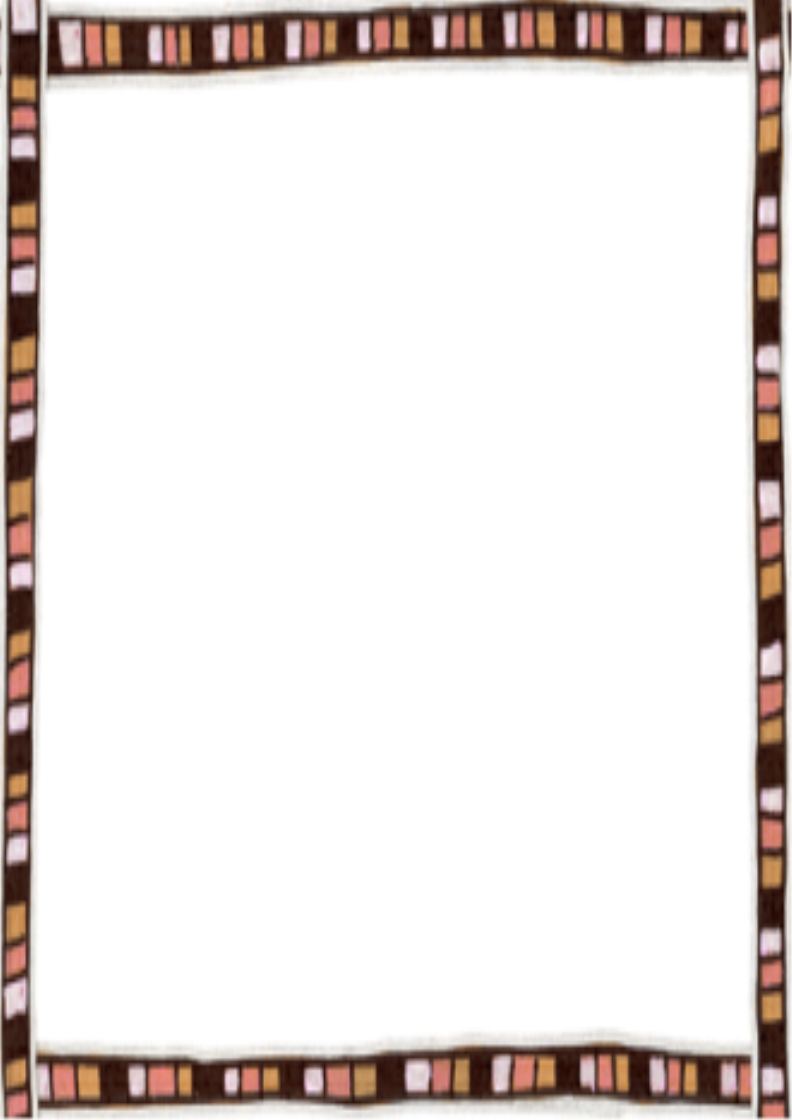
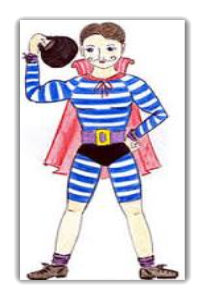
THE STRONGER MAN
Pre-reading
Vocabulary
a purse - гаманець
a shoe (horseshoe) - підкова
to shoe a horse – підковати коня
Answer the following questions
1. Do you know strong famous people?
2. Would you like to be a very strong person?
3. What would you do if you were a very strong person?
Reading
Many, many years ago there was a man in England who was very strong. Everyone knew him. He often said, “If I ever meet anyone who is stronger than I am, I’m going to give him all the money in my purse.”
One day as he was riding somewhere, his horse lost a shoe. When the man came to the nearest town, he asked for someone who could shoe his horse.
The smith in that town was very strong too. The man told the smith to bring him some of the best horseshoes he had. When the smith brought him some horseshoes, the strong man looked at them, took one of them and said, “This is a bad shoe. It’s no good for my horse. Haven’t you got anything better? Look!” And he took it in his strong hands and broke it easily. The smith looked at him, but said nothing. Then he brought another horseshoe. The man took it and broke it as easily as the first one. The smith brought him a third one. The strong man broke it too and then said, “I see that you haven’t got any good horseshoes. Don’t you see that I need something really good for my horse? Bring me one more and I’ll go.” The smith brought a fourth shoe and the strong man gave him some coins.
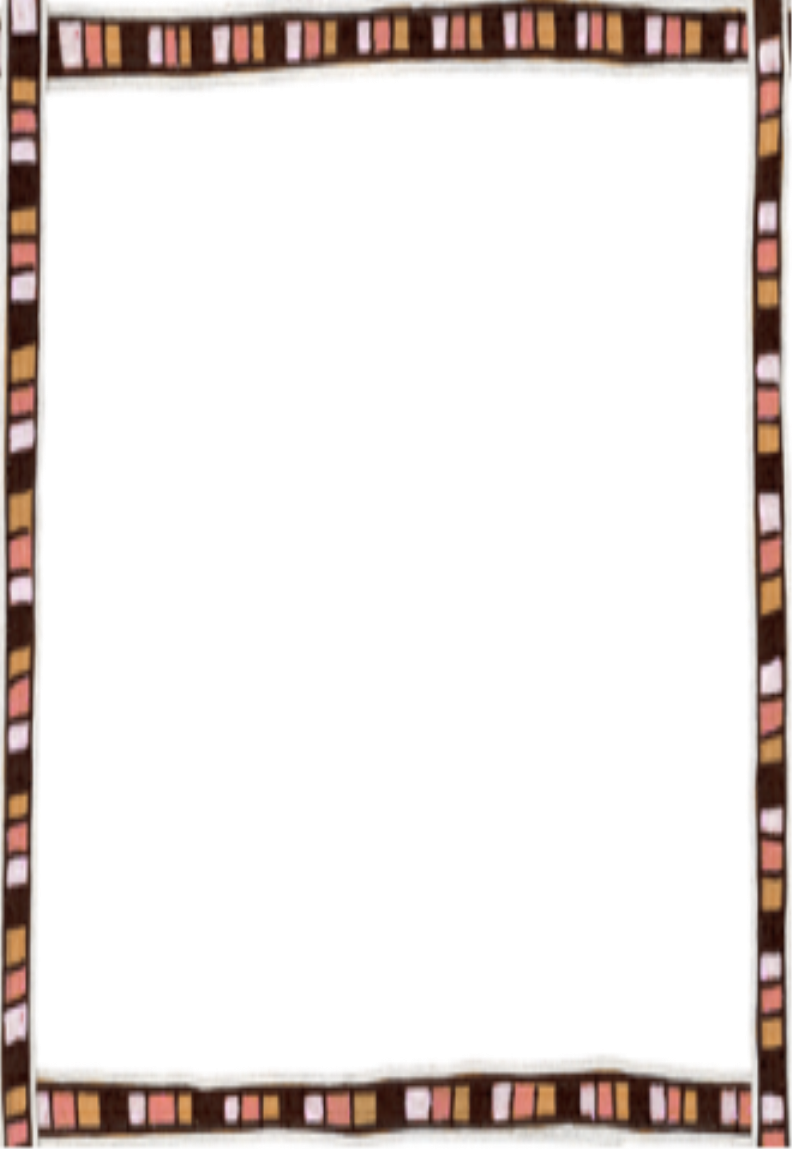 The smith looked at the coins, took one and said, “This is a bad coin. Haven’t you got anything better? Look!” He took the coin between his fingers and broke it into two. It was now the strong man’s turn to be surprised. He didn’t say anything, but gave the smith another coin. The smith broke it too. The man gave him a third coin. The smith broke it like the first two and said, “I see that you haven’t got any good coins. Don’t you see that I need some really good ones? So give me one more and we’ll be quits.”
The smith looked at the coins, took one and said, “This is a bad coin. Haven’t you got anything better? Look!” He took the coin between his fingers and broke it into two. It was now the strong man’s turn to be surprised. He didn’t say anything, but gave the smith another coin. The smith broke it too. The man gave him a third coin. The smith broke it like the first two and said, “I see that you haven’t got any good coins. Don’t you see that I need some really good ones? So give me one more and we’ll be quits.”
The strong man looked at him and said, “I’ve promised to give my purse to anyone I meet, who is stronger than I am. Here it is. Take it! It’s yours now.”
Post-reading
Exercise 1
Choose the correct variant
1. As the strong man was riding somewhere one day,
a)he lost his shoe;
b) his horse lost a shoe;
c) his horse lost its shoes.
2. When the strong man broke the shoe,
a) the smith got angry;
b) the smith said nothing
c) the smith started fighting with the man
3. The strong man broke
a) all the shoes the smith brought;
b) two shoes;
c) three shoes.
 4. The smith broke
4. The smith broke
a) as many coins as the man had broken horseshoes;
b) more coins than the man had broken horseshoes;
c) fewer coins than the man had broken horseshoes.
5. When the man saw that the smith had broken his coin,
a) he was angry;
b)he was surprised;
c)he was glad.
6. When the strong man looked at the smith he said
a) I promise to give my purse
b) I promise to write a poem
c) I promise to shoe a horse
Exercise 2
True or False
1. A long time ago there was a man in England who was very strong.
2. One day as he was riding somewhere, his horse lost a shoe.
3. When the man came to the nearest country, he asked for someone who could shoe his horse.
4. Then he brought another horseshoe.
5. The smith brought a fourth shoe and the strong man gave him some food.
6. He took the coin between his fingers and broke it into three.
7. It was now the strong man’s turn to be surprised.
8. The man gave him a fourth coin.
9. I see that you haven’t got any bad coins.
10. I’ve promised to give my purse to anyone I meet, who is stronger than I am.

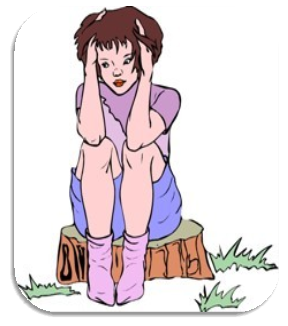
EMILY'S SECRET
Pre-reading
Vocabulary
a secret [ˈsiːkrət] секрет
huge [hjuːdʒ] величезний
embarrassed [ɪmˈbærəst] збентежений
to practice [ˈpræktɪs] практикуватися, тренуватися
Answer the following questions
1. Do you go to school? Do you like it? Why?
2. How many lessons do you have every day? Name them.
3. What is your favourite lesson? Why?
4. What do you usually do at your lessons?
Reading

Emily is 8 years old. She lives in a big house. She has a huge room. She has many toys and she has a lot of friends. But Emily is not happy. She has a secret.
She doesn't want to tell anyone about her secret. She feels embarrassed. The problem is that if nobody knows about it, there is no one that can help her.
Emily doesn't write her homework. When there is an exam – she gets sick. She doesn't tell anyone, but the truth is she can't read and write. Emily doesn't remember the letters of the alphabet.
One day, Emily's teacher finds out. She sees that Emily can't write on the board. She calls her after class and asks her to tell the truth. Emily says, "It is true. I don't know how to read and write". The teacher listens to her. She wants to help Emily. She tells her, "That's OK. You can read and write if we practice together".
So Emily and her teacher meet every day after class. They practice together. Emily works hard. Now she knows how to read and write!
Post-reading
Exercise 1
Choose the correct variant
1. How old is Emily?
a) She is 6.
b) She is 7.
c) She is 8.
2. She has a huge …
a) room
 b) flat
b) flat
c) house
3. What doesn’t Emile remember?
a) how to read and to write
b) the sounds of the alphabet
c) the letters of the alphabet
4. Who helps Emily with her problem?
a) her teacher
b) her father
c) her mother
5. When does Emile meet her teacher?
a) every week
b) every day
c) every month
6. Emily doesn't write her …
a) letters
b) homework
c) tests
Exercise 2
True or False
 1. Emily is 6 years old.
1. Emily is 6 years old.
2. She feels embarrassed.
3. Emily works hard.
4. She has not got many toys and she has a lot of friends.
5. Emily doesn't remember the letters of the alphabet.
6. She lives in a big flat.
7. Emily and her teacher do not meet every day after class.
8. She doesn't want to tell anyone about her secret.
9. Emily doesn't write her homework.
10. She has a small room.

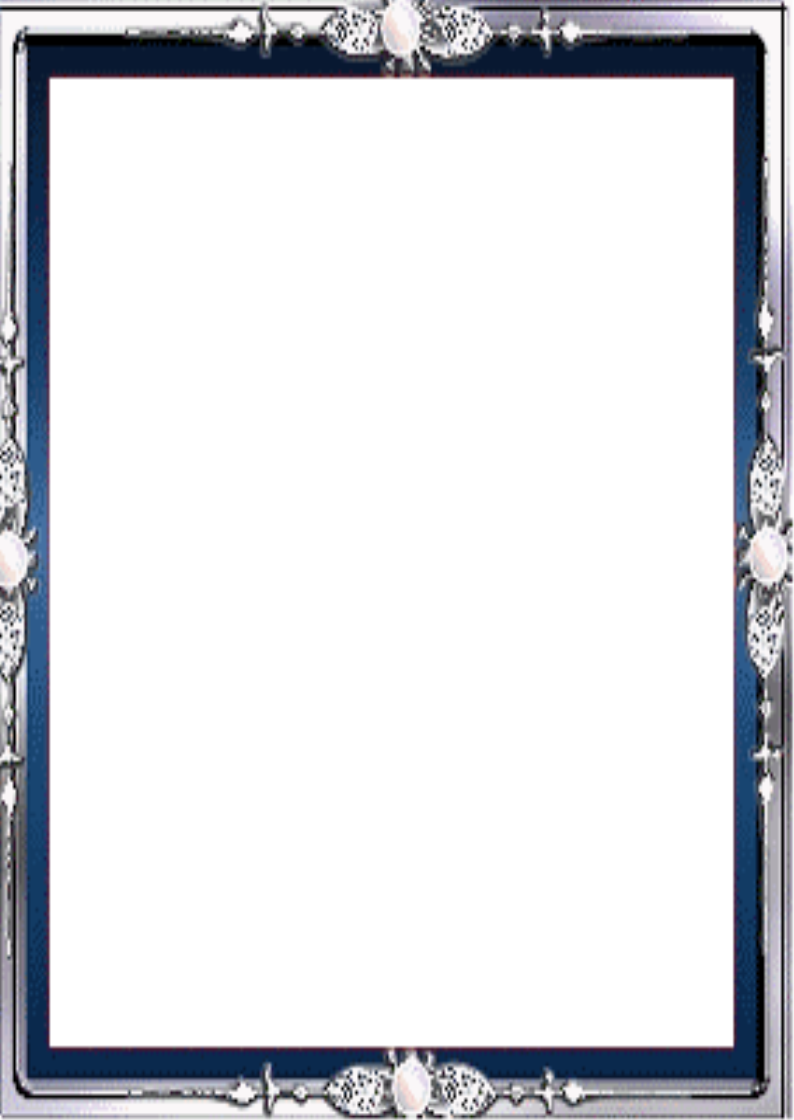
A FRENCHMAN IN NEW YORK
Pre-reading
Choose the correct variant
A hotel - готель
a Frenchman - француз
a wardrobe - шафа
neither nor -не ... не
Answer the following questions
1. What countries do you know?
2. What nationalities do you know?
3. What can you tell about traditions in different countries?
Reading
One day a Frenchman came to New York on business. He did not know English at all. When he came to New York, he took a taxi and told the driver to take him to a hotel. The French and the English for an hotel is almost the same, and, as the Frenchman kept repeating the word, the driver understood him and took him where he wanted.
The Frenchman decided to go for a walk before it grew dark and to look at the town about which he heard people speak so much. So he left his things in the wardrobe in his room at the hotel and went out into the street. The street looked very narrow because the houses were very high. The Frenchman went down the
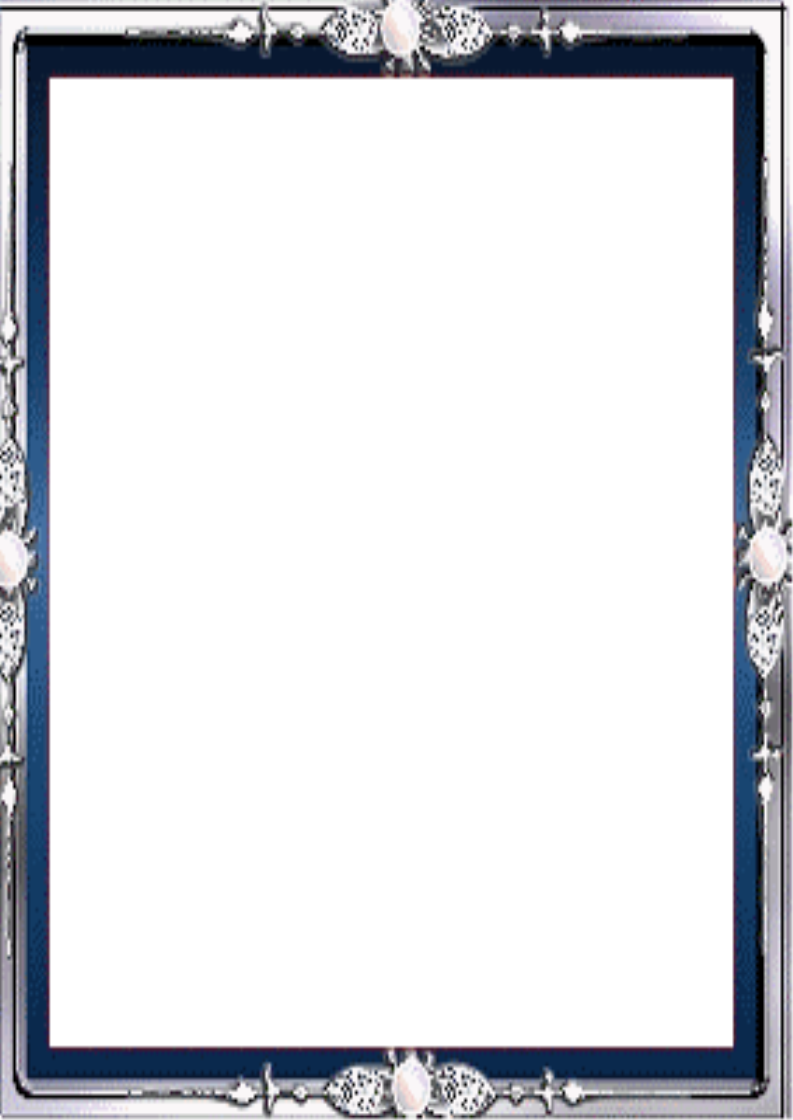 street. Suddenly he stopped.“How am I going to find the way back?” he thought.“I know neither the name of the hotel nor the name of the street in which it is situated.”
street. Suddenly he stopped.“How am I going to find the way back?” he thought.“I know neither the name of the hotel nor the name of the street in which it is situated.”
He did not want to go back to the hotel, so he decided to write down the name of the street. He looked up at the houses and saw some words written in large letters at the corner of the street. He was sure that it was the name of the street, so he took his notebook out of his pocket1 and wrote the words down. He walked about the streets for a long time until it grew quite dark. At last he wanted to get back to his hotel. He took his notebook out of the pocket, stopped a man and showed him the words. The man looked at the words and went on. The Frenchman kept showing his notebook to the people in the street, but they could not tell the way to his hotel. In the notebook they read: “One way street”.
Post-reading
Exercise 1
Choose the correct variant
1.One day a Frenchman came to New York on...
a) business
b) trip
c) shopping
2. The Frenchman ... to go for a walk before it grew dark and to look at the town about which he heard people speak so much.
a) wanted
b) decided
c) liked
3. The street looked very ... because the houses were very high.
a) short
b) long
c) narrow
4. He looked up at the ... and saw some words written in large letters at the corner of the street.
 a) cars
a) cars
b) houses
c) buses
5. He walked about the streets for a long time until it grew quite ...
a) windy
b) rainy
c) dark
6. The Frenchman kept showing his ... to the people in the street, but they could not tell the way to his hotel.
a) notebook
b) laptop
c) copy-book
Exercise 2
True or False
1. One day a Frenchman came to Kyiv on business.
2. The French and the English for an hotel is almost the same, and, as the Frenchman kept repeating the word, the driver understood him and took him where he wanted.
3. He left his things in the kitchen in his room at the hotel and went out into the street.
4. The street looked very narrow because the houses were very low.
5. The Frenchman went down the street and suddenly he stopped.
6. He did not want to go back to the hotel, so he decided to write down the name of the hotel.
7. He looked up at the houses and saw some words written in small letters at the corner of the street.
8. He walked about the streets for a long time until it grew quite dark.
9. At last he wanted to get back to his house.
10. The Frenchman kept showing his notebook to the people in the street, but they could not say the way to his hotel.

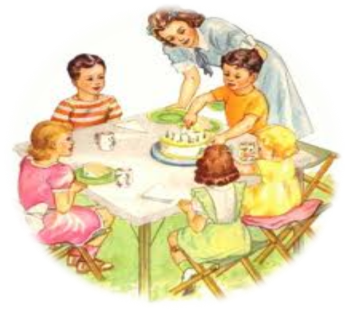
SEAN AND THE BIRTDDAY CAKE
Pre-reading
Vocabulary
a product [ˈprɒdʌkt] продукт
to have fun [fʌn] веселитися
a kid [kɪd] дитина
to behave [bɪˈheɪv] поводитися
Answer the following questions
1. Do you like to have a birthday party? Why?
2. Do you always get many presents? What present did you get last year?
3. Do you like to give presents? What presents do you like to give?
4. Do you always celebrate your birthday?
Reading

Sean likes food. He likes fruit and vegetable. He likes bread and cakes. He likes fish and milk products. He likes meat. He eats everything!
One day he goes to a party. He enjoys at the party with his friends. They dance and they have fun. It is a birthday party for Sean's friend Leo.
At the end of night, Leo's mother comes with a cake. Everyone is very happy. They like sweet cakes. Sean is also happy. He likes food!
Leo's mother slices the cake and gives every kid a piece of cake. Sean is the first one that gets a piece. At first, he is very happy, but after a few moments he turns blue. He runs outside.
When he returns everybody is very surprised. His friend Leo asks him: "Sean, is everything alright? You don't behave like yourself!"
Sean is surprised. "Why, Leo? Why do you say that?"
"Well," Leo answers, "You usually love food very much... You don't run away from food…"
Sean smiles and says: "Yes, Leo, I love food. But that cake is not food…"
Post-reading
Exercise 1
Choose the correct variant
1. Sean likes …
a) to watch TV
b) food
c) to drink cola
 2. Where does he go one day?
2. Where does he go one day?
a) to a party
b) to school
c) to the shop
3. It is a birthday party for Sean's friend …
a) Leo
b) Tom
c) Bill
4. Sean is … one that gets a piece.
a) the third
b) the second
c) the first
5. At first, he is very happy, but after a few moments he turns …
a) yellow
b) blue
c) red
6. What does Sean eat?
a) something
b) nothing
c) everything
Exercise 2
 True or False
True or False
1. Sean likes food.
2. One day he goes to a party.
3. He doesn’t like bread and cakes.
4. At first, he is very happy, but after a few moments he turns red.
5. He enjoys at the party with his friends.
6. Leo's father slices the cake and gives every kid a piece of cake.
7. Sean smiles and says: "Yes, Leo, I love food. But that cake is food too…"
8. He likes fish and milk products.
9. They dance and they have fun.
10. He does not like fruit and vegetable.
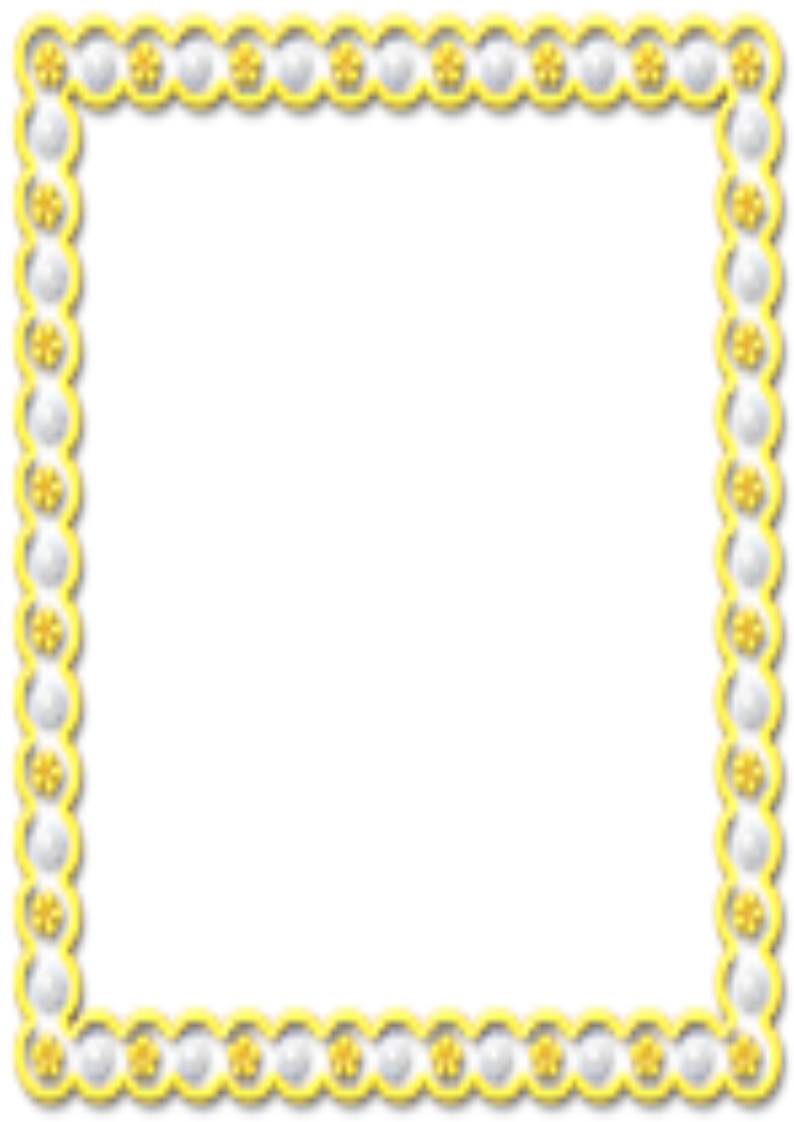
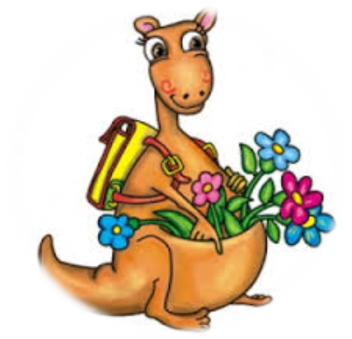
A SURPRISE FROM AUSTRALIA
Pre-reading
Vocabulary
Australia [ɒsˈtreɪliə] Австралія
excited [ɪkˈsaɪtɪd] схвильований
a phone [fəʊn] телефон
to return [rɪˈtɜːn] повертатись
to surf [sɜːf] займатися серфінгом
Answer the following questions
1. Have you got many relatives? What are they?
2. What do you usually get as presents from your family?
3. What do you like more: to give or to get presents? Why?

Reading
The school ends and Erica quickly puts her books in the bag and runs out of the class.
Today is a special day. Erica is very excited. She runs home and thinks about her uncle. She spoke with him on the phone a week ago. He returns from Australia, and he brings a special surprise with him!
Erica is very happy. She thinks about the surprise that he brings.
"Maybe he brings a surfboard? That is fun! I can learn how to surf!"
"Maybe he brings Australian nuts? Oh, I can eat nuts all day!"
"Or maybe he brings a kangaroo? That is not good. I don't have a place in my room for a kangaroo…"
Erica finally arrives home. Her parents are there, and her uncle is there! She is very happy to see him. They hug and she jumps up and down.
"Uncle, uncle," she calls, "what special surprise do you have for me from Australia?"
"Well," her uncle smiles and answers, "I have for you an Australian aunt!"
Post-reading
Exercise 1
Choose the correct variant
1. Why is Erica so excited?
a) because today is a special day.
b) because she has got a birthday party.

c) because the school ends.
2. She runs home and thinks about her …
a) father
b) aunt
c) uncle
3. He returns from …, and he brings a special surprise with him!
a) Australia
b) Africa
c) Great Britain
4. What is the girl’s name?
a) Erica
b) Emma
c) Penny
5. Where does she put her books?
a) in the desk
b) in the basket
c) in the bag
6. "I have for you an Australian …!"
a) kangaroo
b) aunt

c) nut
Exercise 2
True or False
1. She runs home and thinks about her aunt.
2. Erica is not very excited.
3. He returns from Africa, and he brings a special surprise with him!
4. “Or maybe he brings a squirrel?”
5. The school begins and Erica quickly puts her books in the bag and runs out of the class.
6. “I don't have a place in my flat for a kangaroo…”
7. "Well," her uncle smiles and answers, "I have for you an Australian kangaroo!"
8. "Maybe he brings Australian nuts? Oh, I can’t eat nuts all day!"
9. She spoke with him on the phone two weeks ago.
10. Her parents are there, and her uncle is not there!
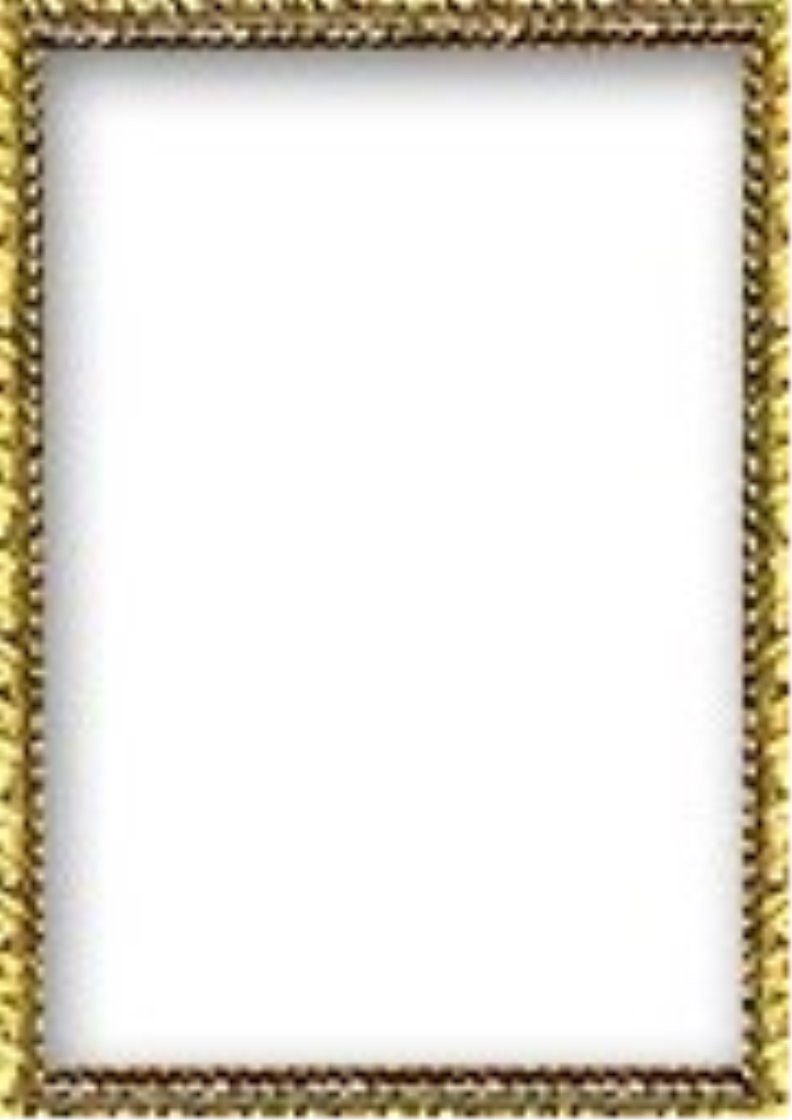
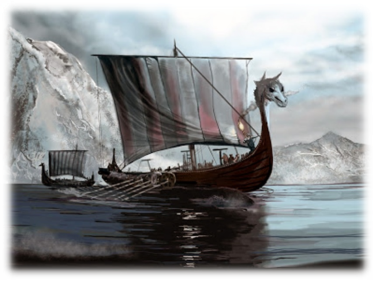
THE DRAGON-SHIP SAILORS
Pre-reading
Vocabulary
a dragon - дракон
exciting [iksaitin] хвилюючий
a sail [seil] парус
carved into the shape – висічений у формі
skillful ['skilful] - досвідчений
an oar[o:r] весло
Answer the following questions
1. Do you know something about Vikings?
2. Would you like to be a Viking? Why?
3. What can you say about their traditions and customs?
Reading
Would you like to ride a dragon?
Of course, you can't really ride an imaginary people called the Vikings sailed the seas in boats called “dragon ships.”The Vikings’ ships were long and light. They could move very fast through the water. The front of a Viking ship was often carved into the shape of a dragon head. This is how the ships got their name. A dragon ship was about 80 feet (24 meters) long. It could carry about 100 men. About 15 men sat on each side to pull at the oars. They worked together to move the through the water. Dragon ships also had big sails to help them move on windy days.
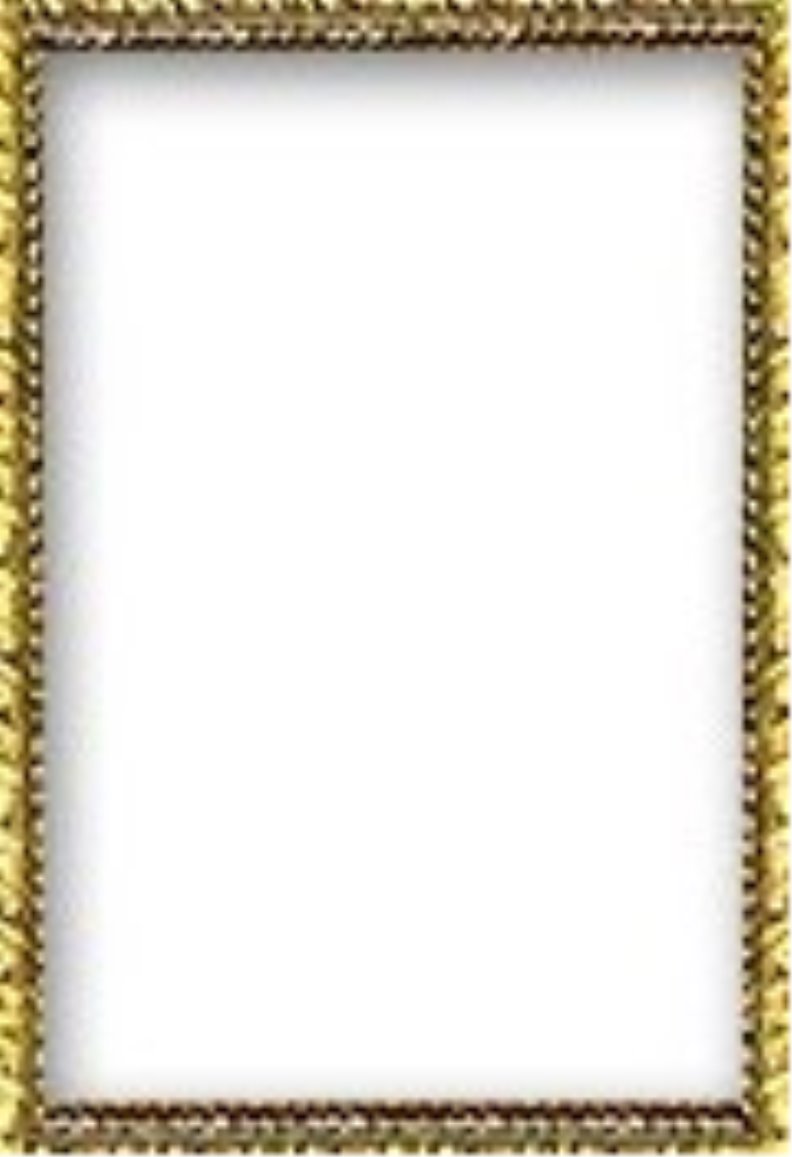 The Vikings were brave, skillful sailors. They came from what are now the countries Norway, Sweden, and Denmark. “Viking” means “someone who looks for adventures on the sea.” The Vikings travelled all around the Atlantic Ocean and the Mediterranean Sea, discovered Iceland and Greenland more than a thousand years ago. They even sailed the way to North America — hundreds of years before Christopher Columbus was born.
The Vikings were brave, skillful sailors. They came from what are now the countries Norway, Sweden, and Denmark. “Viking” means “someone who looks for adventures on the sea.” The Vikings travelled all around the Atlantic Ocean and the Mediterranean Sea, discovered Iceland and Greenland more than a thousand years ago. They even sailed the way to North America — hundreds of years before Christopher Columbus was born.
Post-reading
Choose the correct variant
1.The Vikings’ ships were ... and light.
a) short
b) long
c) narrow
2. They could move very fast through the ...
a) water
b) air
c) oil
3. The front of a Viking ship was often carved into the shape of a dragon ...
a) ear
b) nose
c) head
4. A dragon ... was about 80 feet (24 meters) long.
a) car
b) ship
c) bus
5. Dragon ships also had big sails to help them move on ... days.
a) windy
b) rainy
c) snowy
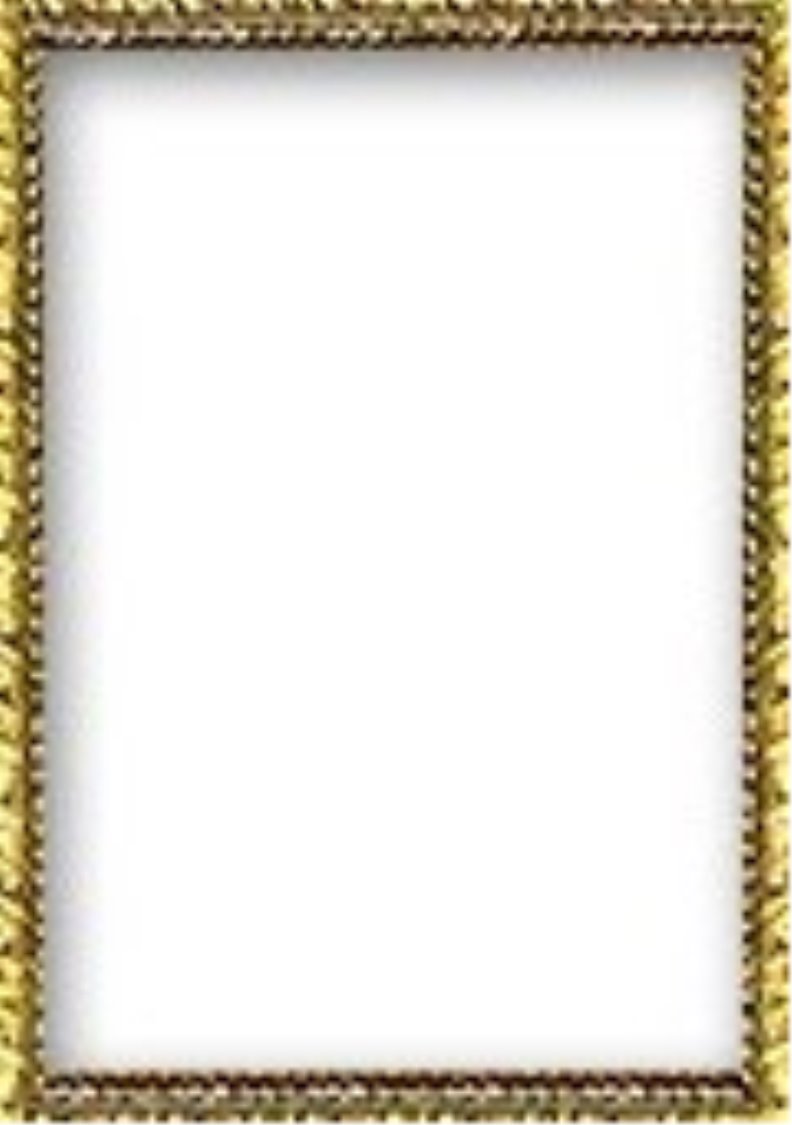 6. The Vikings were brave, skillful ...
6. The Vikings were brave, skillful ...
a) drivers
b) workers
c) sailors
Exercise 2
True or False
1. Of course, you can't really ride an imaginary people called the Vikings sailed the seas in boats called “dragon buses.”
2. They could move very fast through the water.
3. The front of a Viking ship was often carved into the shape of a dragon nose.
4. A dragon ship was about 80 feet (24 meters) short.
5. It could carry about 100 women.
6. They worked together to move the through the water.
7. Dragon ships also had big sails to help them move on rainy days.
8. The Vikings were brave, skillful sailors.
9. The Ukrainians travelled all around the Atlantic Ocean and the Mediterranean Sea, discovered Iceland and Greenland more than a thousand years ago.
10. They even sailed the way to North America — hundreds of years before Christopher Columbus was born.


AMANDA'S WORK
Pre-reading
Vocabulary
hard [hɑːd] наполегливо
to finish [ˈfɪnɪʃ] закінчувати
to change [tʃeɪndʒ] міняти, змінювати
mind [maɪnd] думка, погляд
a waste [weɪst] втрата, марнотратство
to promise [ˈprɒmɪs] обіцяти
Answer the following questions
1. What can you say about your usual day? When do you get up, etc.?
2. Are you tired when you come back home? Why?
3. What would you like to change? Why?
Reading
 Amanda goes to work every day. She works in an office. She works very hard. She starts and 7 o'clock in the morning and finishes at 10 o'clock at night. She likes her work, and she wants to be a good worker, but she has one problem. Her boss is not a very good boss.
Amanda goes to work every day. She works in an office. She works very hard. She starts and 7 o'clock in the morning and finishes at 10 o'clock at night. She likes her work, and she wants to be a good worker, but she has one problem. Her boss is not a very good boss.
He tells her to do one thing, and then he changes his mind. He tells her to do another thing, and then he changes his mind again. He tells her to do something else, and again, changes his mind. Amanda doesn't like this. She says, "This is a waste of time!"
Today Amanda decides to talk with him. She goes to his room and says: "I like to work. I work a lot of hours. I am a good worker. But I can't work like this. We have to work better. You need to tell me what to do without changing your mind."
Amanda's boss listens to her. He sees that she is right. He promises to listen to her advice.
Now Amanda is happy. She comes to work every day. She starts at 7 o'clock and finishes at 4 o'clock, but she completes much more things than before! Amanda and her boss are happy.
Post-reading
Exercise 1
Choose the correct variant
1. Amanda goes … every day.
a) to the shop
b) to work
c) to school
2. What the problem has she got?
 a) Her boss is a very good boss.
a) Her boss is a very good boss.
b) Her boss is not a very good boss.
c) Her boss is not a very bad boss.
3. When does Amanda decide to talk with her boss?
a) tomorrow
b) this week
c) today
4. Amanda's boss listens to …
a) her
b) him
c) them
5. What is the result?
a) Amanda and her boss are happy.
b) Amanda and her boss are not happy.
c) Amanda and her boss are sad.
6. “I work a lot of …”
a) weeks
b) days
c) hours
Exercise 2
True or False
 1. Amanda goes to work every day.
1. Amanda goes to work every day.
2. Her boss is a very good boss.
3. He tells her to do one thing, and then he does not change his mind.
4. She works in an office.
5. Today Amanda decides to talk with him.
6. She does not work very hard.
7. She says, "This is not a waste of time!"
8. He promises not to listen to her advice.
9. Amanda and her boss are not happy.
10. She starts and 8 o'clock in the morning and finishes at 11 o'clock at night.


MEANS OF COMMUNICATION
Pre-reading
Vocabulary
means of communication – засоби подорожування
various - різноманітний
tube - труба
double-decked buses – двоповерхові автобуси
Answer the following questions
1. Do you like to travel?
2. How often do you travel and with whom?
3. What kind of transport do you use for your travelling?
4. What can we do or see while you travel?
Reading
People use various means of communication to get from one place to another.
In the old days people had to travel several days, weeks and months to get to the place they needed. They either went on foot, by coaches driven by horses or on horseback or by boats and ships. Then trains, trams, cars, buses, airplanes, underground and other means appeared.
 Many people like to travel by air as it is the fastest way of travelling. A lot of people like to travel by train because they can look at passing villages, forests and fields through windows. Some people like to travel by car. There they can go as slowly or as fast as they like. They can stop when and where they want.
Many people like to travel by air as it is the fastest way of travelling. A lot of people like to travel by train because they can look at passing villages, forests and fields through windows. Some people like to travel by car. There they can go as slowly or as fast as they like. They can stop when and where they want.
People who live in big cities use various means of communication to get from one place to another.
Do you know what means of communication Londoners use? Londoners use the underground railway. They call it ‘the tube’.
London’s underground is the oldest in the world. It was opened in 1863. There was one route at that time, four miles long. Now London’s underground has 277 stations and it is 244 miles long.
Londoners use buses. The first bus route was opened in London in 1904. Today there are hundreds of routes there. The interesting thing is that some of the routes are the same as many years ago. London’s buses are double-decked buses.
Londoners do not use trams, though London was the first city where trams appeared. And now it is one of the biggest cities in the world where there are no trams. The last tram left the streets of London many years ago.
Londoners use cars. You can see a lot of cars in London streets.
When Londoners leave the town, they use trains, ships or airplanes.
Post-reading
Exercise 1
Choose the correct variant
1. Many people like to travel by... as it is the fastest way of travelling.
a) sea
b) air
c) underground
2. London’s underground is the ... in the world.
a) newest
b) best
c) oldest
 3. Some people like to travel by ...
3. Some people like to travel by ...
a) car
b) ship
c) plane
4. The first bus route was opened in.... in 1904.
a) Paris
b) London
c) Kyiv
5. The last ....left the streets of London many years ago.
a) plane
b) car
c) tram
6. When ....leave the town, they use trains, ships or airplanes.
a) Londoners
b) Ukrainians
c) Americans
Exercise 2
True or False
1. London’s buses are double-decked cars.
2. London’s underground is the oldest in the world.
3. In the new days people had to travel several days, weeks and months to get to the place they needed.
4. The interesting thing is that some of the routes are the same as many years ago.
5. You can see a lot of people in London streets.
6. Now London’s underground has 277 stations and it is 244 miles long.
7. The interesting thing is that some of the routes are the same as many years ago.
8. People use various means of speaking to get from one place to another.
9. The last bus left the streets of London many years ago.
10. A lot of people like to travel by train because they can look at passing villages, forests and fields through windows.


SOME WORDS ABOUT ENGLAND
Pre-reading
Vocabulary
to come back - повертатись
to the seaside- до моря
mile - миля (англійська миля —1609 м)
in the open air – на свіжому повітрі
Answer the following questions
1. Have you ever been to England?
2. Do you know something about England?
3. Would you like to go there? Why?
Reading
Many people have a rest on Sunday in our country. On this day people like to go to the cinema or to the theatre. They often go to the shops on Sunday, but in England almost all the shops are closed on Sunday. The theatres and many cinemas are closed too. People in London like to rest in the parks on this day, or they go to the sea in a car if they are rich. The sea is not far from London, so people go to the seaside in the morning, spend the day there, and come back in the evening. The south coast is only fifty or sixty miles from London. English people like tea very much. They often go to tea-rooms in the day-time if they want some tea. But they will not have tea in the open air because there is often rain in England.

We like to ask our friends to come for dinner or for tea. English people like that too. In our country yon say ''thank you'' after tea or dinner. But in England you must not say ‘thank you’ after tea or dinner. You must say ‘thank you’ when you are leaving. You must thank the Englishman because he has asked you to come.
Post-reading
Exercise 1
Choose the correct variant
1.Many people have a rest on ... in our country.
a) Saturday
b) Sunday
c) Tuesday
2. The theatres and many ... are closed too.
a) cafes
b) restaurants
c) cinemas
3. The south coast is only fifty or sixty miles from ...
a) Washington
b) New York
c) London
4. They often go to tea-rooms in the day-time if they want some ...
a) juice
b) tea
c) water
5. We like to ask our friends to come for ... or for tea. English people like that too.
a) dinner
b) lunch
c) supper
6. You must ... the Englishman because he has asked you to come.
a) hello

b) good bye
c) thank
Exercise 2
True or False
1. On this day people like to go to the cinema or to the theatre.
2. The theatres and many cinemas are opened too.
3. People in London like to rest in the parks on this day, or they go to the river in a car if they are rich.
4. The sea is far from London, so people go to the seaside in the morning, spend the day there, and come back in the evening.
5. They often go to tea-rooms in the day-time if they want some tea.
6. The north coast is only fifty or sixty miles from London. English people like tea very much.
7. We like to ask our friends to come for supper or for juice.
8. In our country yon say ''thank you'' after tea or lunch.
9. In England you must not say ‘good bye’ after tea or dinner.
10. You must thank the Englishman because he has asked you to come.



про публікацію авторської розробки
Додати розробку
